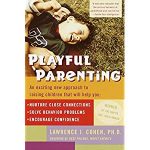
Sign in
Don't have an account with us? Sign up using the form below and get some free bonuses!

It sometimes feels like the world is crumbling around us, and it's worrisome, at the very least. As it is, even the stress inside our very own homes might be more than we feel like we can handle. Something needs to change. What can just one parent do, though?
A lot. With the right support through parent coaching, just one parent--YOU--can be like a pebble dropped into the ocean from high above. You may not feel like you're doing much, but that small ripple of change influences everything around it.
Likewise, when you make small changes within your own family, those changes can grow into a small wave of healing, then into a bigger one--and eventually, we start to erode the old shores--the patterns and stories we've been carrying--that are no longer serving us.
We can replace those patterns with something much healthier, much stronger, and much longer lasting...the power of healing our families.
As it's been said, when you heal yourself, you heal your children's children.
You can read more about the program below, or you can apply right now for parent coaching by clicking this link.
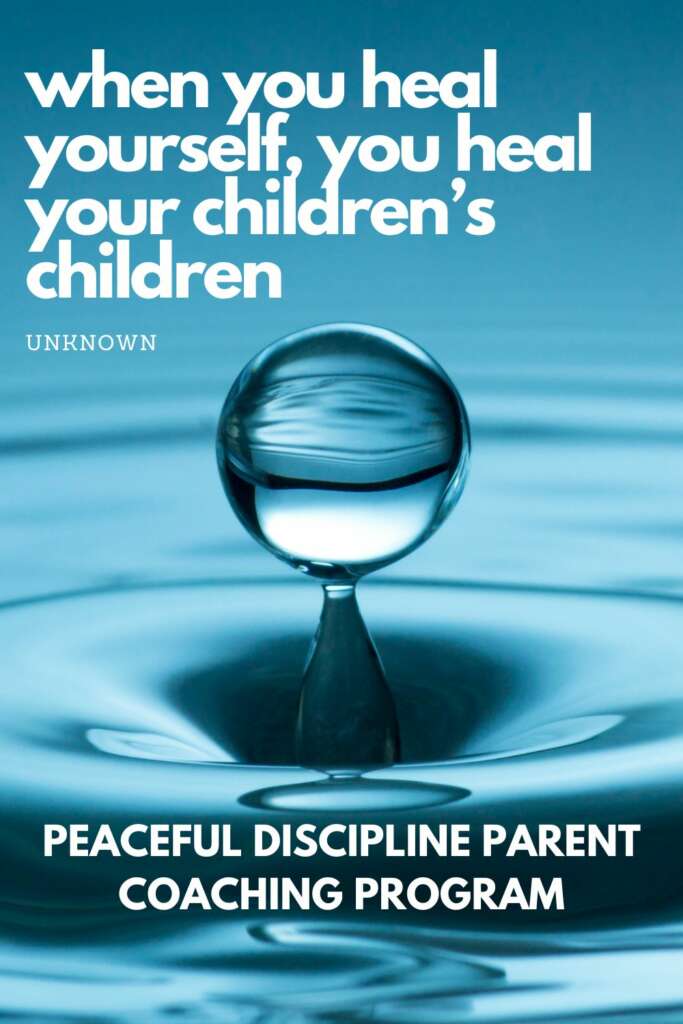
Parent coaching can help us create a better, safer, healthier world for our children, starting within our very own home. It gives us the tools and resources we need to thrive within our family unit.
It can bring our families more peace, joy, and connection. Whether we intend to or not, these gifts ripple throughout our communities and to all the lives we touch.
Parent coaching is here to empower you and your family, providing the support and strategies you need to overcome obstacles. It can help you flourish together.
Sarah R. Moore of Dandelion Seeds Positive Parenting and the American Society for the Positive Care of Children (American SPCC) are launching incredible new parent coaching services, called the Peaceful Discipline parent coaching program. They'll give you practical strategies to help you move from being "stuck" in challenging behaviors to a much healthier place in your communication patterns with your family.
Aside from addressing challenging situations, these parent coaching sessions can also help already-close relationships get that much closer, if you simply want to hone your skills further.
Many aspects of this parent coaching program are truly world-class and offer benefits that no other group coaching plan that we know of can offer.
Examples:
The depth of your trainer's expertise is diverse and exceptional; she truly "gets" more sides of the parenting journey than most others do. She won't just teach you parenting skills to address your child's behavioral challenges; what makes her parent coaching sessions successful is her ability to see behind the parent's behavior. Don't just take our word for it, though. Below, you'll find testimonials from some of her former students.
Every week, you'll have access to pre-recorded interviews with some of the world's most highly sought after experts in child development, neuroscience, behavioral challenges, and personal growth. These alone are a game-changer. You'll find more details in the syllabus, below.
These interviews aren't just generic YouTube videos from parent coaches that anyone can access. Your trainer interviewed each of these experts individually with specific questions in mind to "level up" the parent coaching that's available elsewhere.
Specifically, our goal is to help you feel more peace, joy, and connection with your children as you progress through our parent coaching program--and for many years thereafter. Here's how:
Unlike many other programs, this parent coaching program will support parents in these ways:
Peace
Parent coaching can help a parent or caregiver not only grow their skillset, but also increase their confidence. When you feel more empowered and more confident, you spend less time second guessing your parenting decisions for your kids -- and less time feeling the need to justify your parenting to others. You'll have the education to bring you more peace in your daily life. Moreover, when you feel more peaceful on the inside, you have more peace to share with those around you.
Joy
As a society, we're facing an incredible mental health crisis. Being intentional about creating more joy in your family is a powerful elixir to combat the challenges we face on a daily basis. You'll come away with some specific tools you can use regularly to feel less stress, and more joy, in your heart.
Connection
Rather than a chronic feeling of disconnection with your family, you're likely to "see" each other in a whole new way after this parent coaching program. You'll have the skills you need to feel like a more cohesive family unit.
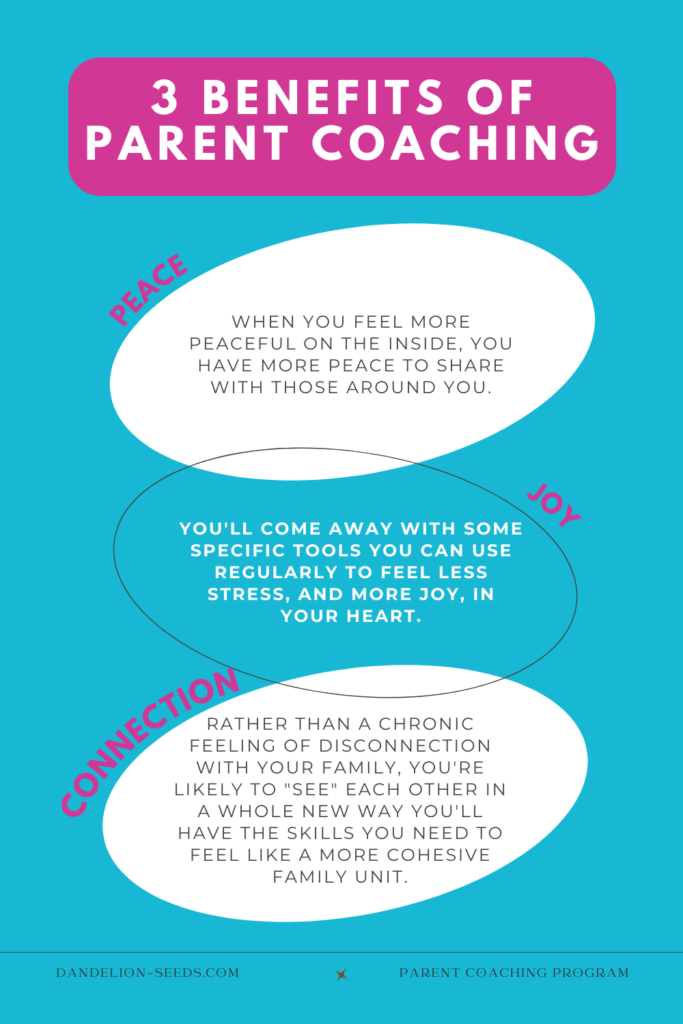
For 12 weeks, you'll meet in an online group setting once per week in a live Zoom class with your trainer. You'll be assigned 1-2 hours of homework to complete outside of class so that you're prepared for the following week's meeting. Rather than "homework," however, we prefer to call it "growth work." You don't turn it in for a letter grade (it's not like school). The work is for your benefit to help enhance your parenting techniques and increase your confidence as a parent or caregiver.
If you don't finish your growth work prior to the class, please come anyway. You're always welcome just as you are.
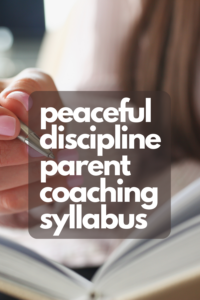
For each of the 12 weeks we meet, we will have at least one expert guest speaker via prerecorded video on the topic that we're covering, all within the framework of respectful, connection-based conscious parenting. You do not need to watch all these videos. Specific instructions will be given before each class. Typically, you'll have one assigned video and/or one optional video to watch, along with the other growth work. Here are some of the experts from whom you might hear on each topic (subject to change).
Week 1: Welcome & intros, knowing our “stories,” reparenting ourselves, and becoming the parent we WANT to be.
Expert videos:
Jessica Joelle Alexander, co-author of "The Danish Way of Parenting" on the basics of respectful parenting; Dr. Sarah Bren on the importance of "good enough" parenting"; Donna Tetrault, author of "The CASTLE Method" on raising emotionally healthy families; Dr. Lynyetta Willis on family of origin; Shelly Robinson, founder of Raising Yourself on re-parenting ourselves; Dr. Robyn Koslowitz on parenting after trauma
Week 2: What's developmentally normal? Supporting wherever your child "should" be.
Expert videos: Dr. Tina Payne Bryson, co-author of "The Whole-Brain Child," "The Bottom Line for Baby," and other books -- on making evidence-based choices for your baby; Dr. Laura Markham, author of "Peaceful Parent, Happy Child" and "Peaceful Parent, Happy Siblings" -- on navigating sibling relationships across different life stages; Debbie Reber, author of "Differently Wired" on neurodiversity; Dr. Ann-Louise Lockhart on highly sensitive children; Phyllis Fagell, author of "Middle School Matters" and "Middle School Superpowers" -- on the middle school years; Luis Fernando Llosa, co-author of "Emotionally Resilient Tweens and Teens" -- on supporting these young adults; Julie Lythcott-Haims, author of "Your Turn: How to Be an Adult" and other books -- on preparing our children to launch
Week 3: Understanding your nervous system, your reactions, and your triggers – setting your brain & body up to help you.
Expert videos: Dr. Stephen Porges, author of "The Polyvagal Theory"; Dr. Mona Delahooke, author of "Beyond Behaviors" and "Brain-Body Parenting"; Maggie Viers, founder of The Empowered Family
Week 4: Yelling less, connecting more: releasing healthy anger without shame -- and supporting your children in their anger, too.
Expert videos: Dr. Ross Greene, author of "The Explosive Child"; Robyn Gobbel, author of "Raising Kids with Big Baffling Behaviors"
Week 5: Unpacking boundaries, punishment and “consequences” – what the research says about effective discipline.
Expert videos: Katherine Reynolds-Lewis, author of "The Good News about Bad Behavior"; Iris Chen, author of "Untigering"; DJ Johnson, motivational speaker; Mr. Chazz
Week 6: It’s never too late to heal (or too early).
Expert videos: Dr. Daniel J. Siegel, co-author of "The Whole-Brain Child," "Parenting from the Inside Out," and many other books; Eli Harwood, author of "Securely Attached" and founder of Attachment Nerd; Bethany Saltman, author of "The Strange Situation"
Week 7: Understanding what actually drives children’s independence and skill-building.
Expert video: Dr. Vanessa Lapointe, author of "Parenting Right from the Start" and "Discipline without Damage"
Week 8: Raising resilient children: emotion coaching, big feelings, and personal growth.
Expert videos: Dr. Michele Borba, author of "Thrivers" and many other books; Dr. Anne Lane, author of "Nurture Your Child's Emotional Intelligence"; Dr. Robert Brooks and Dr. Samuel Goldstein, authors of "Tenacity in Children: Nurturing the Seven Instincts for Lifetime Success"; Dr. Bill Stixrud and Ned Johnson, co-authors of "The Self-Driven Child" and "What Do You Say?: How to Talk with Kids to Build Motivation, Stress Tolerance, and a Happy Home"
Week 9: The importance of showing up for yourself: how to feel heard, validated, and supported in your parenting.
Expert video: Caroline Welch of the Mindsight Institute and author of "The Gift of Presence"
Week 10: Using improv, play, and stories as teaching tools.
Expert videos: Dr. Larry Cohen, author of "Playful Parenting"; Vivek Patel of Meaningful Ideas; Andrew Newman of Conscious Stories
Week 11: The importance of simplifying childhood.
Expert videos: Kim John Payne, author of "Simplicity Parenting" and other books; Dr. Meghan Owenz, author of "Spoiled Right: Delaying Screens and Giving Children What They Really Need"
Week 12: Evidence-based physical and mental health strategies.
Expert videos: Dr. Elisa Song, founder of Healthy Kids Happy Kids; Dr. Nicole Beurkens, author of "Life Will Get Better"; Jennifer Anderson, founder of Kids Eat in Color; Tessa Stuckey, LPC, author of "For the Sake of Our Youth"; Janine Halloran, founder of Coping Skills for Kids; Jess Lahey, author of "The Addiction Inoculation" and "The Gift of Failure"; Konika Ray Wong, founder of Girl Power Science; Seth Perler, executive functioning specialist; Dr. Rocio Zunini, neuroscientist & infant sleep expert
Bonus week (optional): Support for educators.
Expert videos: Dr. Jamie Chaves & Dr. Ashley Taylor, authors of "The Why Behind Classroom Behaviors"; Annie Murphy Paul, author of "The Extended Mind"; Dr. Peter Gray

Yes. The American SPCC has accredited Sarah's program so you can be sure everything you learn is evidence-based, effective, and applicable to a wide range of parenting and education scenarios.
Both the American SPCC and Sarah R. Moore are committed to making the world a safer and more loving place for children. We are committed to changing the world for the better, starting with the way children experience safety and well-being at home--with the understanding that they'll "pay forward" to the world what they've experienced firsthand.
Sarah R. Moore is the author of Peaceful Discipline: Story Teaching, Brain Science & Better Behavior and founder of Dandelion Seeds Positive Parenting. As a certified Master Trainer in conscious parenting and Board Member for the American Society for the Positive Care of Children (American SPCC), she’s also a public speaker, armchair neuroscientist, and most importantly, a Mama.
Her work has been featured on NBC, CBS, and SiriusXM. She's also been featured in countless podcasts, parenting summits, and in print publications (HuffPost, The Natural Parent Magazine, Green Child Magazine, Yahoo!, Motherly, Scary Mommy, and many others).
With training in child development, trauma recovery, interpersonal neurobiology, improv comedy and play, her work supports parents and caregivers around the globe. Follow her on Instagram, Facebook, YouTube, TikTok, Pinterest & Threads.

Sarah has trained hundreds of people in parent coaching, including:
biological parents, grandparents, and great-grandparents
adoptive parents
foster parents
expectant and new parents
parents of young children, tweens, teens, and young adults
parents of children who've long since left home
current parent coaches
social media influencers
educators
therapists
medical doctors
And many others--from novices to experts in the field of child development.
The American SPCC's vision statement summarizes their work well: "American SPCC is dedicated to being part of the solution by offering life-changing education and support to caregivers. When caregivers are empowered with the knowledge that even small actions can have significant impacts on a child’s development, we can ultimately break the cycle of trauma before it’s passed down.
We also know the struggles of parenthood look different for every family. That’s why we offer support by meeting caregivers where they are at, without judgment or expectations. We recognize parenthood is difficult, especially when combined with hardships related to relationships, employment, mental health, physical health and more."

"I had the privilege of being coached by Sarah, and I cannot express how much my personal and professional life was impacted by her wisdom, guidance, and expert coaching. Her compassionate and empowering coaching techniques allowed me to tap into my own inherent wisdom, helping me to feel safe, supported, and seen. Not only did I walk away from my coaching engagement with Sarah with practical parenting strategies and tools to use in my daily life, but I also concluded my experience with so much more self-compassion, something Sarah helps all parents cultivate. Sarah is truly a master at what she does and I absolutely recommend working with her if you're looking for support, guidance, and encouragement on your conscious parenting journey." - Shelly Robinson, founder of Raising Yourself
"I've known Sarah for a few years now. I've had the good fortune of being coached by her and I can tell you that yes her wisdom and knowledge on the subject matter is phenomenal. You can see her passion and witness her expertise. At the same time there is something very comforting about her presence, the way she holds space for you without any judgment and with so much compassion and solidarity. She has a way to put you at instant ease with her so much warmth that you can feel it radiate even though you aren't in the same room as her ( not the same hemisphere in my case ! ) Her kind guidance has made such a huge impact on our family and I'm so grateful for the wonderful human that you are." - Dilshad, founder of The Gentle Mamma
"Sarah is truly a gift! I had the joy of taking one of her classes and I looked forward to her presence every week. As a coach and educator she is the embodiment of kindness, empathy, knowledge, and support. I feel very lucky to have learned from Sarah and I have all the confidence that her new program will be as remarkable as all the work she’s put forth leading up to this exciting new project. Thank you for all I’ve learned and continue to learn from you, Sarah." -Haley Turner, Sweet Home Parenting
"Working with Sarah is the best investment I’ve ever made for me, for my family, and for my approach to life. Her kindness and authenticity will change your life for the better, too." - Katherine Tasheff
"Working with Sarah R. Moore has been transformative for me as a parent coach. Her unparalleled expertise and coaching skills have not only deepened my understanding of effective coaching strategies but have also empowered me to create meaningful and lasting change in the lives of the families I work with. I am grateful for her guidance and support as it has helped me empower parents with confidence." - Candice Cochrane, Parents of Presence
"I am incredibly grateful for Sarah’s guidance as a parent coach. Her unwavering empathy and compassion created a safe space where I’ve learned to navigate the complexities of motherhood. Sarah’s insights have not only transformed my approach to parenting but have also positively impacted countless others like me. Her commitment to fostering conscious parenting is truly inspiring." - Jaymie of MyMumDiaries
"I had the pleasure of working with Sarah as my coach and trainer. Never having met her, I immediately felt her warmth and caring nature even over the computer screen. She made me feel safe, heard and seen. I was able to open up to Sarah about things that were very uncomfortable, and she always held such a supportive space for me to express my feelings. Sarah guided me and gave me the confidence to use my voice in not only my personal life, but my professional life as well. I am forever grateful to have Sarah in my life." - Katie Mae Ramirez Parent Coaching
"Sarah Moore is an answer to a desperate prayer. My wife and I were incredibly frustrated with how our life as parents was going, especially with our youngest son. Neither spanking nor timeouts worked, and we were left wondering if there was some better way to parent. After some time, I made the decision to go through training to become a peaceful parenting coach. Sarah was my trainer in the program. Week by week, I found myself growing in my ability to calm myself down and to be predictably calm for my sons. Sarah’s genuine care for our cohort members, her skill and insight, and her relational warmth made it possible for me to transform as a parent AND to develop my own parent coaching practice. Sarah’s book as well as her social media posts keep the parenting inspiration and motivation going. I am a huge fan and cheerleader of and a friend to Sarah R. Moore! Thank you so much for your work! - Brandon Miller, Confluence Parenting
"Sarah has left a lasting and wonderful impression on me both in my parenting and my coaching. She is kind, empathetic and extremely knowledgable, and knows exactly how to explain something to make it fully relatable. It was such a pleasure to be trained by her and I hope our paths cross many more times!" - Sarah D.
Although valued at more than $8000, the one-time introductory rate for group parent coaching is $1200 USD, payable in full before your first session begins.
Many parenting summits are several hundred dollars, without any personalized support. Many professional coaches and therapists charge upwards of several hundred dollars per hour.
If you take this $1200 and divide it among 12 weeks of live group coaching, and the expert interviews to which you'll have full access, and the priceless and positive changes you're likely to see in your family, this may be the best investment you'll ever make--especially at this introductory rate.
 How do I sign up?
How do I sign up?Before you officially enroll, we will ask you to fill out an application to make sure it's a good fit for you as well as for us. We want to make sure you're clear that parent coaching doesn't just "fix your kids' behavior." In fact, it's often the caregiver who needs the right tools to meet the child wherever they are developmentally. The services we offer are parent-centric, to help you develop the skills you need to be peaceful, patient, and present with the children in your life.
Parent coaching services are designed to help families navigate the complexities of raising children in today’s world. Partnering with a parent coach provides access to abundant knowledge and resources tailored to unique parenting challenges. Parent coaching is centered around building stronger relationships within the family and nurturing positive behaviors in children.
With the help of a dedicated parent coaching session, you’ll learn new skills and strategies to become a better parent, empowering you to teach your children more effectively. Recognizing each family’s uniqueness, with its own strengths and challenges, is a fundamental aspect of parent coaching. Parent coaching, with its focus on the present moment and a collaborative approach, enables parents to acquire the skills necessary to handle their child’s behavior, and uncover the root causes of their own behavior, as well.

What parent coaching isn't
Parent coaching services aren't therapy. Also, they aren't designed to support underlying mental health issues. Although certainly not all parents do this, many choose to couple therapy with the skills and techniques they're learning in our course.
Although we can't speak to or guarantee individual outcomes, we do know from our experience that in many cases, once children feel their caregivers' emotional attunement and skillset increasing, better behavior is often a natural byproduct of that. Many parenting challenges often melt away.
Also keep in mind that we use a parent-centric approach to parent coaching, so rather than a focus on behaviorism (only changing our kids' behavior), we focus on ourselves--the adults--with a whole family perspective. We know that the only behavior we can control is our own, so we empower you to optimize your own ability to be a good parent that's responsive, compassionate, and who has developmentally appropriate expectations of your child.
Parent coaching extends beyond addressing challenging child behavior; it also involves fostering positive ones. Through parent coaching sessions, parents learn evidence-based strategies and practical tools to encourage positive behaviors in their children.
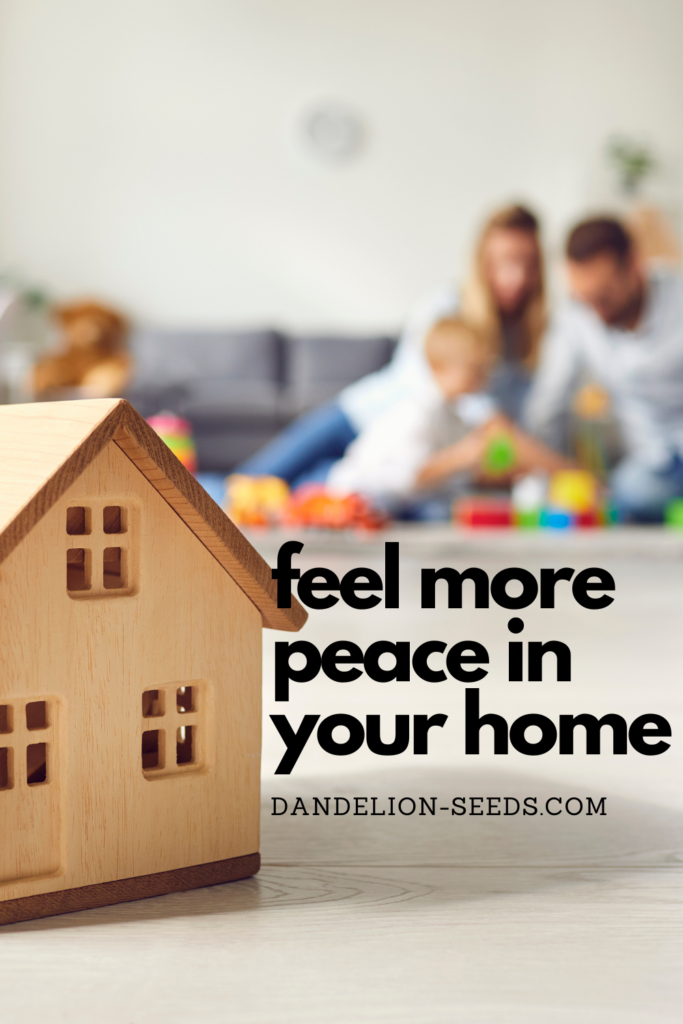
Although this program will certainly empower you to help others and touch lives in ways you may have never dreamed possible, this program is for your own personal growth, not to pass along coaching services to others. If you're looking for more, please discuss that directly with your trainer.
As parent coaches, we are trauma aware and work to take a sensitive approach to whatever our clients have experienced. Although we are not a trauma recovery program, several of our experts address these topics we cover from a trauma informed perspective.
At the core of parent coaching is the goal of fostering healthy, secure, and nurturing parent-child relationships. Building these connections requires effective communication and teaching children essential life skills. By learning active listening, understanding what boundaries really mean, and prioritizing connection over blind compliance, parents can create an environment where children feel heard and supported. As a result, children can develop a sense of trust and ultimately, a foundation for emotional well-being.
Parent coaching also recognizes the unique role that biological, adoptive, foster parent, and kinship parents play in reversing the harm inflicted on children who have endured abuse, neglect, or abandonment. By employing adaptive communication techniques, parent coaching can help parents navigate these sensitive issues and foster healing within the family.
Parent coaching is adaptable, supporting a broad range of family needs. Single parents can benefit from the personalized guidance and resources provided through parent coaching, helping them navigate the unique challenges of raising a child on their own. Parenting coaches also offer valuable support to blended families, providing strategies and tips to foster a loving and harmonious environment, promoting effective communication and conflict resolution.
Families with special needs children, including autism spectrum disorder, can find invaluable support and guidance through parent coaching, as it equips parents with effective parenting skills, improves communication and advocacy, and encourages self-care and well-being. Furthermore, parent coaching can support families facing a wide variety of challenges, providing tools and strategies to address these issues and foster a nurturing, supportive environment for all family members.
If you're raising a young person who's strong willed, it can certainly be challenging. This type of child's powerful will can seem to overpower the energy of a room with their determined nature to get their way.
There may be more going on for people--especially children--when they seem strong willed, however. It's often a mask for something else.
There are many synonyms for a strong willed person of any age, including kids--and most aren't particularly flattering. Here are several examples:
Stubborn
Headstrong
Obstinate
Combattive
Resolute
There are more synonyms of being strong willed, of course, but you get the gist.

As humans, our brains seek something called confirmation bias, which means "...the tendency to search for, interpret, favor, and recall information in a way that confirms or supports one's prior beliefs or values." (source)
In other words, if we think our of someone as being strong willed, confirmation bias tells us with every hint of pushback that we were right about our belief, even if there's more going on beneath the surface. However, that's not always what's really happening.
The way we view kids matters, and the paradigm shift to make parenting easier is to realize kids are doing the best they can with the physical and emotional skills they've learned so far. It takes 25-30 years for kids' brains to fully develop, so it behooves us to look for the good in what they've learned and the behavior they're exhibiting.
Related post: When Does Parenting Get Easier?
Strong willed kids need these two things from their parents every day:
Permission to express themselves and be fully heard, without us interrupting or telling them why they "must" do what we say. Often, the child's perspective is that we--the adult--are the one who's strong willed. When we soften and get curious about what they're trying to communicate, they often soften in return. We need to focus less on being "right" and, instead, on being a safe emotional place for them to express themselves. Over time and by us modeling effective communication, they'll learn.
If we see them as "talking back," we can reframe it as "they're learning to stand up for themselves." That's a good and healthy life skill that we can navigate with compassion. Here's how.
Extra gentleness. Beneath the surface of the strong willed child's demeanor is often a deeply sensitive soul who's simply put on "armor" of appearing strong when, in reality, they need someone who deeply strives to understand their needs and help them feel less overwhelmed by the world.
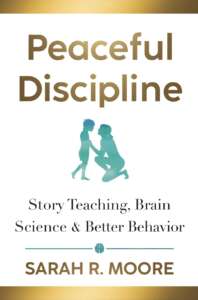
Strong willed children are often the ones who, provided they're not "squashed" by those who overpower them emotionally, grow up to have incredible drive, emotional strength, and resilience.
Most of all, when problems arise, remember that it's not you versus your child in a battle of strong wills. Instead, it's you alongside them against whatever problem you're trying to solve together.
When we hear the term "highly sensitive child" (HSC), we may think about an anxious child or an intensely shy child who cries often or is easily overwhelmed. Although sensitive kids may exhibit those traits on occasion, you may be surprised to learn those aren't actually the hallmarks of most highly sensitive kids.
This article will dispel common myths about highly sensitive kids and give parents tools to support their children exactly as they are. I'll share the five important things you need to know later in the article. First, I'll define what sensitive means, and what it doesn't.
To be clear upfront, though, know this: there's nothing "wrong" with high sensitivity. In fact, did you know that sensitive persons may have been instrumental to human survival?
Sensory processing sensitivity [more on this term in a moment] is thought to be one of two strategies that evolved for promoting survival of the species (Aron and Aron 1997; Wolf et al. 2008). By being more responsive to their environments, these more sensitive organisms have an enhanced awareness of opportunities (e.g., food, mates, and alliances) and threats (e.g., predators, loss of status, competitors), and thus may be more ready to respond to emerging situations. (source)
If highly sensitive people are partially to thank for the continuation of human existence, it's time we understand more about them--and help them thrive in today's environment.
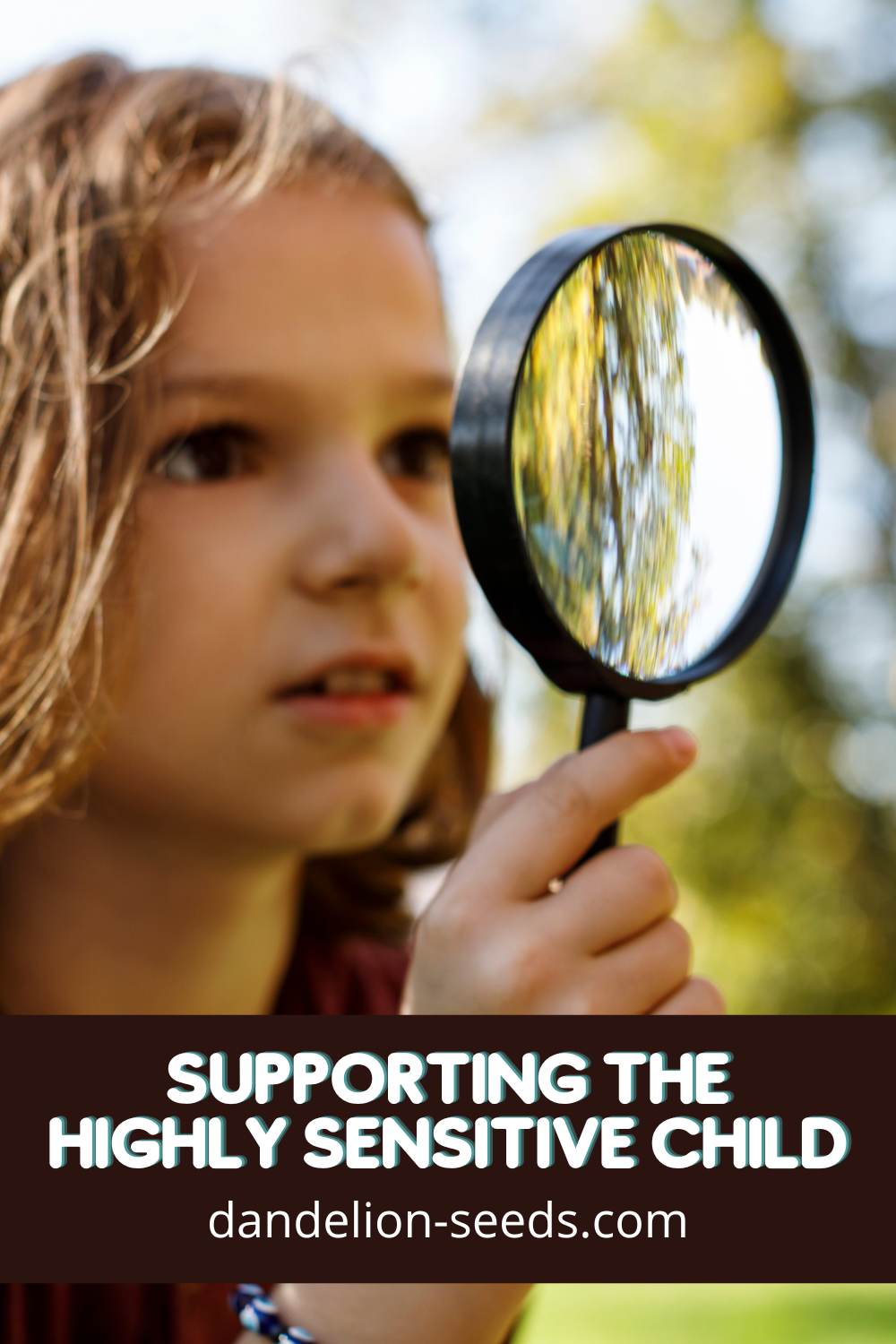
A highly sensitive person (HSP) or, in the case of children, a highly sensitive child (HSC) is:
"...a term coined by clinical psychologist Elaine Aron. According to Aron’s theory, HSPs are a subset of the population who are high in a personality trait known as sensory-processing sensitivity, or SPS. Those with high levels of SPS display increased emotional sensitivity, stronger reactivity to both external and internal stimuli—pain, hunger, light, and noise—and a complex inner life." (source)
In other words, a highly sensitive child may literally experience the world around them differently than others do. They're often more aware of their environment and all that's surrounding them, from the lights in the room to the smells coming from the kitchen and the noises coming from outside. Sensitive people are often hyper aware of their physical surroundings.
Their emotional world may differ from others', too. A highly sensitive child is a deeply feeling child. Big emotions can be overwhelming for many HSCs. It does not mean they're "moody" or "difficult." In fact, highly sensitive people, including sensitive kids, sometimes feel all their emotions extra intensely, including the emotions most people perceive as pleasant, such as joy and gratitude.
Additionally, their self-awareness and empathy may also be greater than others', so they're often caring friends and are deeply loyal to their family members. Their empathy and loyalty can offer them some distinct advantages in friendships and other close relationships (source).
In short, there's nothing at all "wrong" with a highly sensitive child. In fact, they're invariably an exceptional child with traits that, if we take the time to understand how to support them well, we can frame as superpowers.
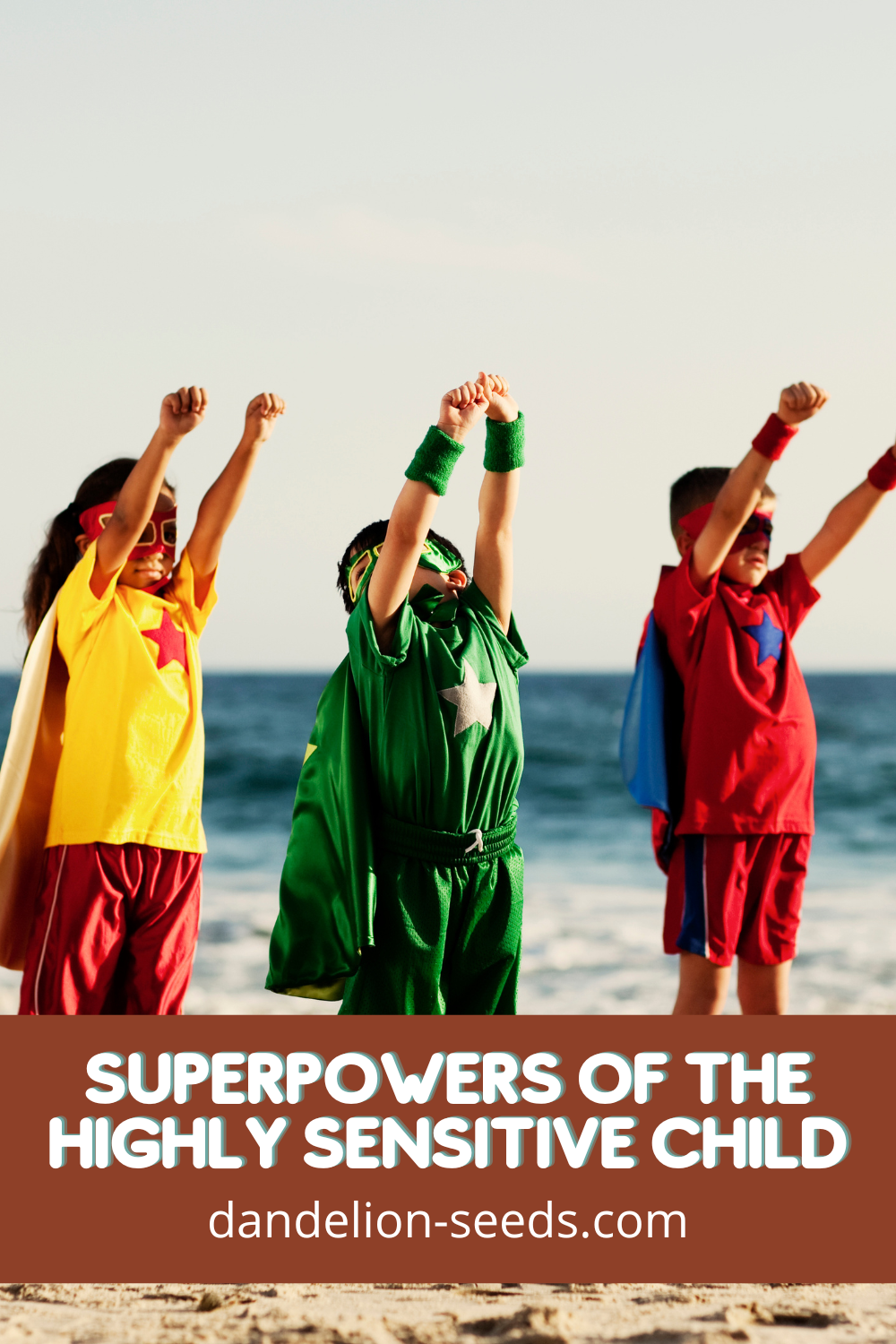
In addition to the empathy and loyalty mentioned above, most HSCs have greater self-awareness than others. They can sense subtle changes in not only their own emotions, but also in those of others. This can be a gift to their families in that they're often highly intuitive and can sense and adapt to the emotional tone of the room. They often come across as "wise beyond their years." This is especially true if they've received consistent emotional support early in life.
With this innate wisdom, they can often be a wonderful support to others. When they care, they care deeply. They may also be mature for their age, having picked up on and learned social cues from adults.
They may be cautious observers, sometimes seeming to hold back from larger groups while they gauge their safety, emotionally and otherwise. They often pay close attention to details, as well as the "big picture" of the world around them.
Many adults may have the sense that highly sensitive children are "wallflowers" or other less-than-flattering synonyms. However, not every highly sensitive child, or "shy" child, is an introvert (source). Perhaps surprisingly, few adults (parents, teachers, or otherwise) realize that 30% of sensitive children are extroverts. An extroverted child may be very outgoing and seem to thrive in busy environments, and still be highly sensitive.
Let's look at how a highly sensitive child who's an extrovert might perceive a situation. Although they might be outgoing and quick to play a game they don't know how to play in the spirit of making a new friend, let's say the other child laughs at them for not knowing the rules.
Although the child might've displayed extroverted characteristics in engaging boldly with someone new, that same outgoing child may deeply feel the insult. They may feel frustrated or hurt longer than some might expect, because the wound may run deeper than it would for some children. Extroverted children need as much emotional support as the child who seems to withdraw or be more introverted.
In addition to not every sensitive child being "slow to warm up," some can be hurt by labels. Mislabeling a highly sensitive child as "shy" can damage their self-esteem.
"...Labelling a child 'shy' means you're talking about who they are as a person, not just their behaviour. Children will often take others' observations seriously, especially those of the people they look up to..." (source)
Additionally, shyness is sometimes misconstrued as social anxiety. It's not.
"...Social anxiety disorder...involves the experience of anxiety and self-critical evaluation in social settings response to the fear of evaluation by others of one’s public performance. It has a greater disruptive influence on one’s social behavior than the experience of shyness..." (source)
Shyness isn't "bad," but as western cultures tend to value extroversion more, the label may prove damaging to the child. (source)

Being a highly sensitive person means little more than having certain temperament traits common to sensitive people. It is not a medical diagnosis, although it can be measured medically:
[SPS] is a temperamental or personality trait involving "an increased sensitivity of the central nervous system and a deeper cognitive processing of physical, social and emotional stimuli". The trait is characterized by 'a tendency to 'pause to check' in novel situations, greater sensitivity to subtle stimuli, and the engagement of deeper cognitive processing strategies for employing coping actions, all of which is driven by heightened emotional reactivity, both positive and negative'. (source)
Interestingly, it is possible to measure greater levels of sensitivity in MRI scans (source). Moreover,
[SPS] is becoming increasingly associated with identifiable genes, behavior, physiological reactions, and patterns of brain activation (Aron et al. 2012). A functionally similar trait—termed responsivity, plasticity, or flexibility (Wolf et al. 2008)—has been observed in over 100 nonhuman species including pumpkinseed sunfish (Wilson et al. 1993), birds (Verbeek et al. 1994), rodents (Koolhaas et al. 1999), and rhesus macaques (Suomi 2006).
Highly sensitive pumpkinseed sunfish. Huh.
High sensitivity is increasingly recognized in the medical community, but it's not a diagnosis and needs no "fixing." Although that's great, we also need to know how this affects our day-to-day life in parenting.
Being a highly sensitive person, whether child or adult, means feeling deeply. The "highs" of life may feel euphoric and joyful; the "lows" may touch on despair. Of course, a highly sensitive person will spend plenty of time in the emotional middle ground, too--but when they're inclined to feel something strongly, it may be amplified as compared with others' emotions.
As such, a highly sensitive child has a nervous system that can be easily overstimulated. They may be prone to expressing big emotions, because their nervous system is literally experiencing them as feeling bigger than those of other people.
Some highly sensitive kids will despise clothing tags, for example, because they find them uncomfortable. A less sensitive person might feel frustrated by what seems like "no big deal," but these kids are literally feeling them differently on their skin.
Not every highly sensitive child will care one whit about clothing tags, however. Each child's development is different, and sensitivity will show up in different ways for different people.
Highly sensitive children do not, by definition, have any "disorder," including attention deficit disorder, and they're not necessarily more anxious than other kids.
Further, they don't grow out of it by a certain age, nor are they "problem children." In fact, many highly sensitive kids are extremely well behaved due to their self-awareness and extremely perceptive understanding of others' experiences.
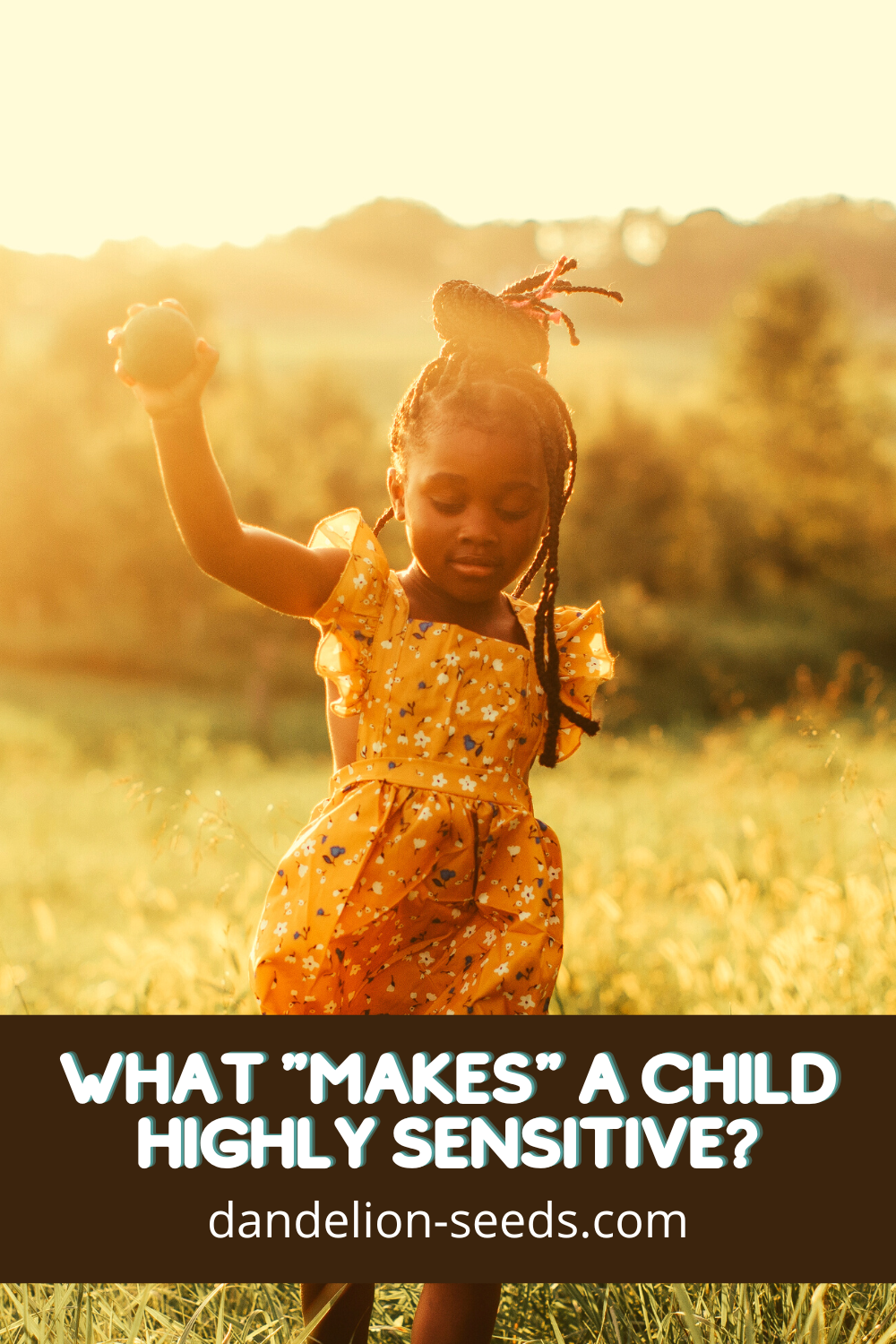
High sensitivity comes from not only the same types of genes that affect other temperament traits, but also the child's environment:
"...genetic factors account for between 20% and 60% of the phenotypic variance in personality, which means that the remaining 80% to 40% of the variance is attributed to environmental factors. Clearly, the environment is very important to temperament." (source)
Does this mean parents "make" their children sensitive? Not necessarily. Environment is important, but genetics play a strong role, too. As an example, let's think about hair. If a blond-haired child spends a lot of time in the sun, their hair is likely to get lighter. Conversely, if they spend more time indoors, their hair isn't likely to lighten much. There's variation within the "blondness" that can be affected by environment.
At the same time, if you put a black-haired child outside, it's highly unlikely that their hair will get substantially lighter. Their genes simply don't allow for that.
When it comes to a highly sensitive child, we can influence their sensitivity through their environment, but we can't give them genes they don't have, nor can we take away the genes they do have.
Highly sensitive children grow up to be highly sensitive adults. How we support and nurture them, however, can help determine how effectively they manage their sensitivity, and whether they see it as a gift or a hinderance.
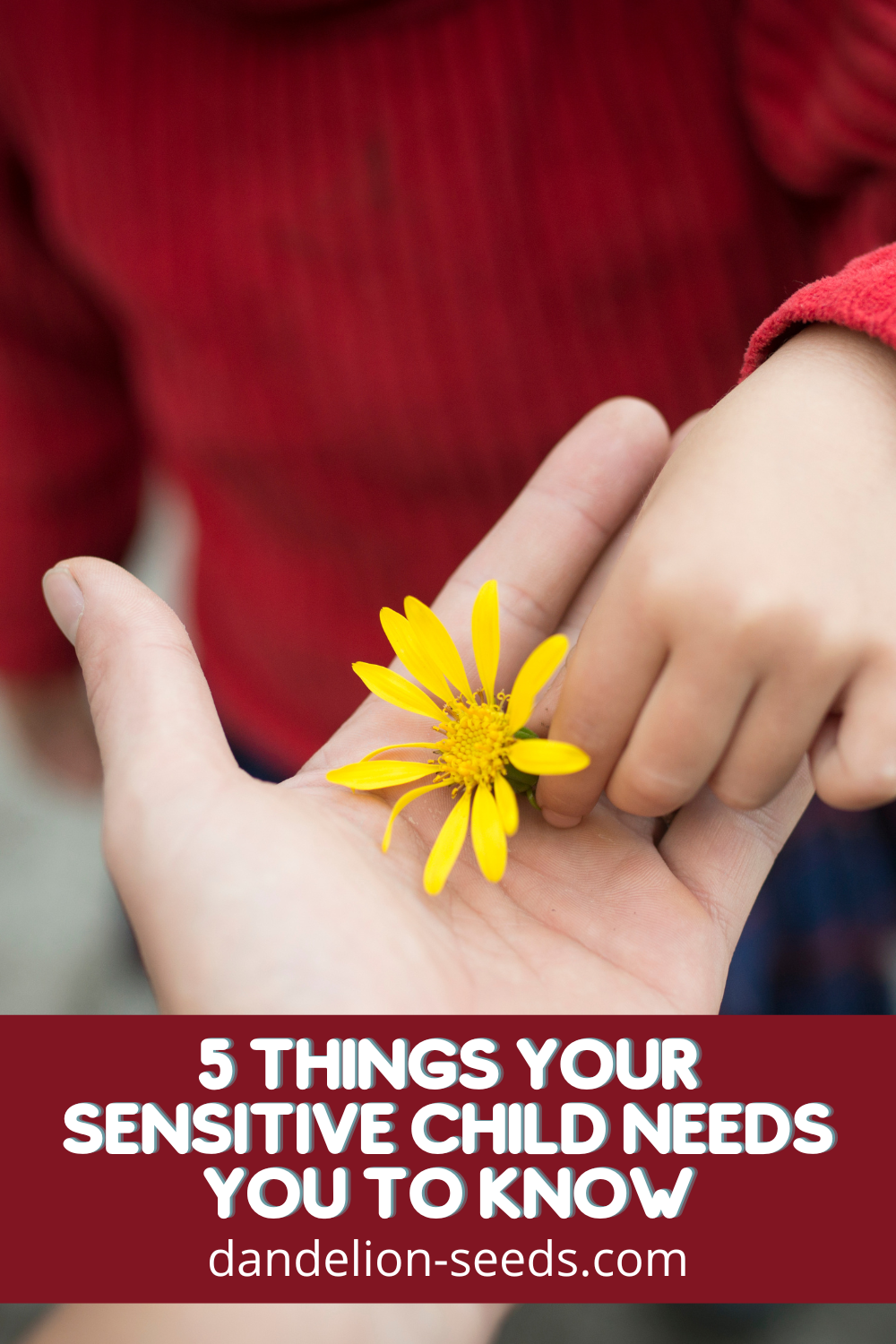
Know that the highly sensitive temperament means the child will experience legitimately more intense emotions than nonsensitive children. Feeling emotionally intense can be both wonderful and difficult; higher "highs," but also lower "lows."
As such, it's helpful to be emotionally attuned to their feelings. Something that might bother other kids only a little, for example, might be truly disturbing to sensitive kids. Check in. Validate what their emotional experience is, rather than projecting your own or assuming all children feel the same way about their experiences.
A toddler was meeting her uncle for the first time. Her uncle, assuming this child was like his own children, attempted to bond with her by startling her with an unexpected "Boo!" The child, however, was more startled than he anticipated, and she burst into tears. She withdrew from him for the rest of their day together, which was the opposite effect of what he'd hoped would happen.
In this example, the uncle could've paused to read the child's body language and see if she was advancing toward him with curiosity and playfulness, or retreating when he got closer, rather than charging at her with the "boo."
Although toddlers aren't developmentally ready to regulate their emotions, we can work with older highly sensitive children on their emotional regulation skills. This is not to say we should stop anyone from feeling their feelings. Quite the contrary.
Instead, we set them up for future success by teaching them what to do with their big emotions. This will help them immensely not only with their day-to-day existence, but it will also help them adapt in new situations as they arise.
Your child will experience their surroundings differently than others will.

If a highly sensitive child is at a birthday party standing next to other children, hearing the same sounds and seeing the same lights, the highly sensitive child may literally experience those sounds and lights as being louder and brighter than the others kids do.
It's important to have a proper understanding of the child's perception; they may simply be highly aware of their surroundings, and therefore, may need more downtime to compensate for all the sensory input.
Be proactive about creating downtime before and after big-to-them events. Your child's nervous system will need the extra support and empathy for everything it's processing all at once. Your child may need more emotional support than some others do, including for some, more physical touch and words of affirmation.
Your tone and emotional authenticity matter. A lot.
Because highly sensitive children are often so in tune with their surroundings, they're likely to notice subtle changes many others might miss.
Let's say you have a challenging day at work. You come home and are happy to see your family, but you've got some lingering stress. The highly sensitive child may pick up on this stress, but because you've only said that you're "fine," they'll pick up on the disconnect between your tone and your words.
Younger children, in particular, may be prone to assuming that you're upset with them, even if it's not true. They simply don't know what else might be bothering you besides their presence, so they internalize the worry and their sense of emotional safety decreases.
Imagine what they're likely to be "reading" in your demeanor. In age-appropriate ways, be transparent about what you're feeling so they don't assume they've caused you to feel upset. Further, you can model for them healthy ways of managing your stress so that they learn how to release their own struggles.
Being authentic also helps the highly sensitive child learn to trust their intuition.
Your child probably wants you to unapologetically advocate for them until they're able to advocate for themselves.
Be aware of their school setting. Teachers understand that different children have different temperaments, and they can be aware that the highly sensitive child may not act quickly or feel emotionally prepared when pushed far out of their comfort zone. Instead, the teacher can help them ease into new situations by talking about them beforehand and showing empathy when kids are slow to warm up to new children, or activities, at school.
If you homeschool or unschool, child-led learning often helps highly sensitive children thrive.Ask for your child's consent to speak with the teacher. If they give it, follow through. This doesn't mean "coddle" the child; it means support them.
You aren't "making" a child be more sensitive by being responsive to their pleas for love and attention. Some family members may erroneously say things like "You're creating a mama's boy" or a "daddy's girl," but those are old clichés that serve no purpose . To the contrary, being responsive to a child's needs helps promote their independence. Responsiveness, along with attunement to a child's emotions and experiences, are proven to nurture secure attachments (source).
Adults in your child's life may pressure you to be tougher on your child to "prepare them for reality."
Remind those adults that we're raising children for the world we want. The gentler we are with children, the more gentleness they'll have to pass on to others as they grow up. Harshness breeds more harshness and disconnection. Kindness begets kindness. We are preparing them for reality if they grow up choosing friends and partners who treat them kindly and respectfully. They won't stand for less.
The most important thing parents and caregivers can do for sensitive kids of any age is to accept them for who they are, without trying to change them or "toughen them up." In fact, if we try to make them tougher, it may backfire--causing them to feel less supported, and more insecure.
A highly sensitive child can be extremely secure in their sense of self, especially when surrounded by adults who celebrate and cherish their sensitivity. In fact, as they grow, they can share their gifts with others. Celebrate and support these kids exactly as they are.
In Thrivers, The Surprising Reasons Why Some Kids Struggle and Others Shine (available here), Michele Borba, ED, internationally renowned educational psychologist and bestselling author of Unselfie (here), explains the seven character traits that will safeguard children against adversity in this uncertain world. Dr. Borba encourages parents with common sense advice -- specifically, seven essential life skills -- that help children not only face struggles with greater ease, but come out stronger because of them.
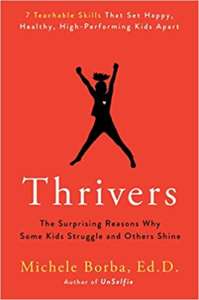
With the current childhood mental health crisis, Thrivers belongs on every parenting bookshelf in the world. It's a deeply researched instruction manual for raising emotionally healthier kids.
With this in mind, here are the three of the many reasons parents need to read Thrivers today:
In the United States alone, approximately 4.4 million children aged 3-17 have diagnosed anxiety (source); and 1.9 million have diagnosed depression (source). The reasons why some kids struggle so considerably are manyfold, but Dr. Borba offers practical advice to parents about how we can help turn these numbers around for the better.
Specifically, in Thrivers, her timely and important book, she encourages parents to teach kids and young adults these seven character traits to offset the effects of adversity: self-confidence, empathy, self-control, integrity, curiosity, perseverance, and optimism.
Dr, Borba combed scientific studies about what contributes to kids' negative thinking, then developed age-by-age steps to building resilience and nurturing a growth mindset. What you'll notice is that the mindset kids have is teachable; children don't need to be born with resiliency and grit to be thrivers.
Children become thrivers tomorrow because mentally strong parents prepare kids for the future today.
Recently, Sarah R. Moore of Dandelion Seeds Positive Parenting met with Michele Borba ED to discuss these reliable predictors of success, and how parents can point kids in the right direction. We all know raising children isn't easy, but we can absolutely help our children thrive.
Dr. Michele Borba, ED discusses Thrivers, The Surprising Reasons Why Some Kids Struggle and Others Shine. This is an excerpt; watch the full interview here.
Hello friends, I am here today with Michelle Borba, ED, to discuss Thrivers, The Surprising Reasons Why Some Kids Struggle and Others Shine. I'm so excited to share her goodness. I want to know how we can teach kids to be thrivers in this very uncertain world. We are better for her books and for the knowledge that she shares with us.
A moment ago, before we started recording, you told me that Thrivers has been a passion project. Can you tell me a little bit about what drove you to write it?
My whole life, I've been trying to figure out why some kids struggle and others shine. As a special education teacher, I observed that all the kids coming into my class were identified as having severe learning difficulties, for some reason.
However, some of them were struggling less and seemed to be bouncing back. Maybe they weren't going to be bouncing back academically, but they still had confidence. I've kept track of them and many of them are doing quite well in the world right now.
So, it was that moment that I decided to start studying resilience. There's some amazing work that I think is untapped, and that we're not using as parents.
"The first thing I discovered is that resilient children are made resilient. They're not born thrivers. So that means we, as parents, have a lot to do with it. It's not DNA. It's not temperament. It's not birth order. It's that they seem to have protective factors from a skill set that they can learn." - Michele Borba ED, author of Thrivers
The thing that's wonderful is that we can teach those skills, and it's not for tomorrow. We're going to do it the rest of our parenting career. And as a result of our efforts, we're going to help our kids. The same skills help them in the classroom will also help them in life. Here's what they encompass:
That's what Thrivers is -- pulling the science and coming up with practical strategies so we can raise up a strong generation of kids who thrive.
That is beautiful. That is truly world-changing work when you raise a whole generation of people who are more resilient and more able to handle adversity.
I think it's really important to put a reset button on this.
We know that this generation is well loved. They're well educated. They're more diverse and they're wonderful. However, I began to see some stats that were mind-boggling. I learned that they were also the loneliest, most stressed, most mentally exhausted, and they felt empty. And then came the COVID-19 pandemic.
The CDC is showing us that those challenging issues only amplify in a crisis such as the pandemic, even affecting kids at younger ages.
"If a child doesn't have those protective buffers, they'll suffer. But if there's any silver lining to this, it means now is the time to teach the skills." - Michele Borba ED, author of Thrivers

Let's backtrack for just a second. It would be really helpful for people to understand in that thrivers are.
What does it mean? What does it look like? Do you see them walking up the street and go, "Hey, those are thrivers?"
I can see thrivers from a mile away. Not everyone can see them from a mile away because it's more of what happens on the inside as opposed to the outside, but it's basically a kid who's got an "I can do this -- I've got this" kind of an attitude.
"When any kind of little stumbling block comes along the way, thrivers don't quit, give up, or try to have somebody else do it for them. Thrivers find a way through. They brush themselves off and start all over again when necessary. That's what thrivers are." - Michele Borba ED discusses the mindset kids have when they're thrivers
What I discovered is that successful children and young adults usually have strengths in their minds, hearts, and will. We'll discuss how we can point kids towards these things and teach kids these seven character traits that are reliable predictors of success.
That makes so much sense because who we are matters, not what we're doing. That said, so much of society looks at what we're doing.
What is our kid's GPA? How many activities are they involved in? Are they "on track" from the ripe old age of 4 to get into the perfect university 14 or 15 years later? What should we do to help people look beyond the accomplishment -- grades, test scores, whatever it is, and see the whole child?
I agree with everything you said, except I'd say it starts at age 2. It's starting even then -- so early. The most interesting part of the research when I was writing Thrivers, is I interviewed 100 kids, one on one, for an hour each.
I asked them, "Prior to the Covid-19 pandemic, I understand you were the most stressed out generation known to man. Do you agree?"
"Oh, yeah, we are," they said.
"Well, what's causing it?"
Kid after kid said almost the same thing that you just said, but in kid language. One kid said it the best.
He said, "I think it's because we're being raised as products and not humans, and we're more than test scores." - A child Dr. Borba interviewed while writing Thrivers: The Surprising Reasons Why Some Kids Struggle and Others Shine
And it hurts so bad to hear him say that because, of course, we want our kids to succeed, but we may be overlooking the inside stuff.
When I asked the kids, "What are your hobbies?" They all looked at me, like "What do you mean? We have this activity and this activity and this activity..." -- but hobbies help a child decompress.
A very simple perspective is, don't overlook the ordinary things that help your kid become extraordinary. When we look at the research, many of the resilient kids use prayer or spirituality. It helps them decompress.
Now that may not be for you -- fine -- other kids go read. Other kids say, I listen to a certain kind of music. Other kids walk around the block or shoot baskets. The point is that they figure out how to decompress and they go to that.
"When push comes to shove, what we're doing is waiting until the kid is an anxiety attack and then trying to teach him how to calm down. By then, it's too late. Helping kids feel connected to something greater than themselves is one of the highest correlations to reducing stress." - Dr. Michele Borba, author of Thrivers: The Surprising Reasons Why Some Kids Struggle and Others Shine
When kids become self-absorbed, what happens is their empathy goes down. Their stress goes up.
After awhile, what happens, because you have to dial your empathy down when you're stressed -- because you're in survival mode -- burnout is the outcome.
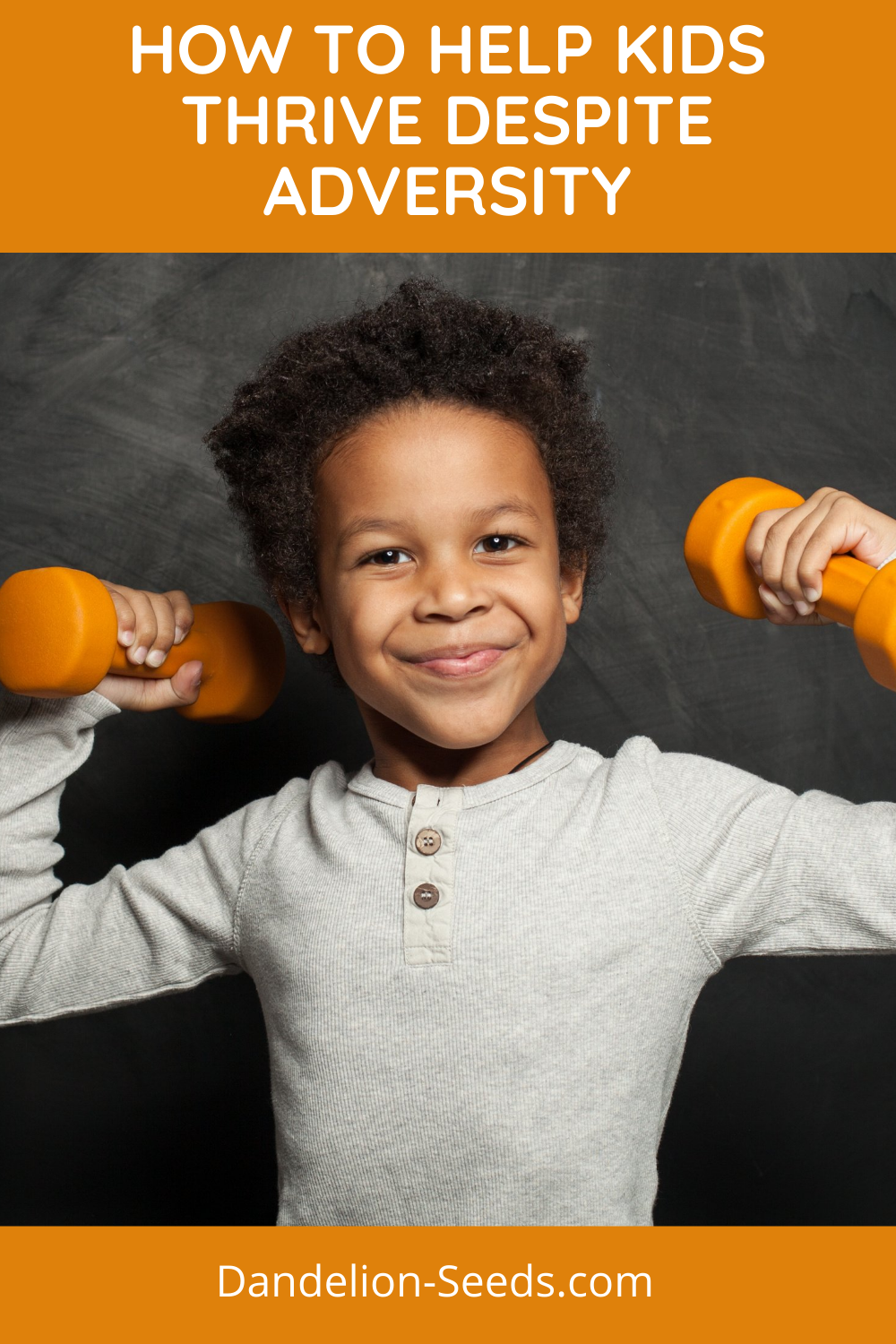
There's hope for mental health turning around. Maybe the place to start is with parents who say, "Okay, now we've listened. So what are we going to do about this?"
The first step to change is realizing this is not an overnight process. It's not going to be difficult. You don't need a PhD and it's not another program or an app.
It's just intentionally saying, "I'm going to make sure that my child also learns to thrive." Now, let's figure out "What am I going to do tomorrow?"
Yeah, and what a paradigm shift for so many of us, big and small.
I think, perhaps, we often approach this the wrong way. In Unselfie, you wrote about the role of empathy and connecting with one another, and seeing other people's perspectives.
We sometimes think that to help our kids grow their empathy, we just need to tell them how others feel. It's more than that, though.
Empathy is probably the most highly correlated to mental health. And when we're looking at what's going on right now, and why are kids tanking?
It's because they're lonely. They don't have social connection. They're looking at screens and not each other. So what do we do?
Don't throw up the white flag and go, "I can't do anything."
The first thing is, they need to practice empathy. It's kind of like a muscle and it needs to be stretched and worked out.
You can do that at home, with your family meetings. You can do it with listening.
Maybe the fastest thing with a young child is tell them, always look at the color of someone's eyes when you're talking because it first of all, it makes the child hold their head up. If your child holds their head up, they're going to be seen as more confident.
That's cool.
The second thing is they'll start noticing is the person's face.
Realizing the other person exists, and the gateway to empathy, is emotional literacy.
So what are they going to be doing? They're going to be looking at the facial expressions.
And now here's your next tip that for the next three, four, five years, start talking about feelings more naturally with your kids. You can't empathize and feel with another person unless you realize, she looks sad, or he looks upset, or he sounds grumpy.
If you're asking, how do I do that during a pandemic?
You tell your kid, let's call Grandma, but it's always through Skype or FaceTime, and you prime the child before they begin.
Listen to Grandma's voice, and you'll know when she's tired, and it's time to hang up, or watch her face, and you'll know when she's happy, or when she's sad.
You'll know what to say.
You can prime the child, but note this other little point.
All the research says we do a far better job of teaching empathy with our daughters at age 2, than we do with our sons at age 2. We need to do this with boys, too.
So just talk naturally.
If you have a middle school kid, watch the movie Inside Out or a show on TV. Every once in a while, turn the sound off and do feeling charades. Ask, "How do you think he's feeling right now?"
Just talk about it because that's the first gateway to empathy. Then you can help your kids start stepping into the shoes of somebody else.
You mentioned that thrivers don't have to thrive only because of their DNA. Much of their ability to be thrivers stems from what we can teach them through their childhood and family relationships. At the same time, we know kids are born with different dispositions and temperaments.
For example, my daughter is very sensitive. I remember her being two years old, and we were in a store one day where there was a large photo on the opposite side of the store from where we were. From across the busy store, she looked at the photo and asked, "Mama, what are those people feeling right now?"
We were surrounded by all sorts of things that could've been overloading her sensory systems at this busy store, but she wanted to know what those people in the photograph were feeling. On the flip side, I know plenty of kids who might see me bawling my eyes out, for example, and they'd be like, "Everything's fine. She's happy. I don't see it."
How does the innate difference in the "wiring" of these kids play out in empathy and becoming thrivers?
I love that question, because sometimes we've got one kid who watches Bambi and is a basket case for the rest of their life. We've got another kid who watches it and is fine.
There are actually three kinds of empathy. I call it the ABCs of empathy. You're going to be able to figure out which of your kids are strong in which area, and there's where you parent.
You might have a child who sees somebody in distress and soon, they're sobbing with them. What you want to do with that child is give them permission to step back. Let them know they can't take it all in. They can't solve everyone's problem. You need to give them permission so they don't care so much.
I love Mother Teresa -- she had the best of the best lines. She said, if I kept looking at all the masses, I would be a basket case. I can't do it. All the people who are starving; all the people that were hurting. So I just look for one, and that helps. You say, "What is the one thing you can do for that one person?" We can't solve everybody.
The second kind of child may not be the crying kind. They may not be the one who looks like they're upset, but they're actually quieter. They're more the thinking kind. Don't assume they don't have empathy.
They're trying to process it and they're trying to think about how that other person feels. Where's he coming from? Oh, bless this kid, because that's what we need. They have what's called perspective taking skills. That is, by the way, the top employability factor right now, as Harvard says. We want kids to step into others' shoes.
Now to that kid, you have to say, "You don't have to agree with what someone else says. Just try to understand where they're coming from."
The final kid is the kid who wants to step in and do something. That's the behavior side. And that's what's called empathy, and action, and compassion.
When I interview those kids, it's each one is so different on what their passion is. As a parent, we need to ask, what's driving your child's concerns? Let the child lead you in that direction.
I have three boys. When they were little, I took them to see the movie, The Bear. I didn't realize it was so sad. My little one was a basket case. By the end, he came home and said, why are they shooting the bears? He said to me, "I've got to dictate this letter to you so you can send it to the President. Stop killing the bears."
I thought, "Well, this is gonna go over like a lead balloon," but he dictated a letter, I put it in an envelope, lo and behold, that kid got letter after letter after letter from the government. He knew he had to take action. Gosh, am I glad he dictated the letter and I put it in the mail. It helps our kids know that when you have stress, you can be a change maker. You can make a difference. It's one of the best ways to reduce a child's stress.
Michele Borba, Ed.D. is an internationally renowned educator, award-winning author, and parenting, child and bullying expert recognized for her solution-based strategies to strengthen children’s empathy, character, and reduce bullying. She is an NBC contributor who has appeared over 150 times on the TODAY show and featured on countless shows including: Dr. Phil, Dateline, The View and CNN. Her 24 books have been translated in 20 languages including End Peer Cruelty, Build Empathy, Building Moral Intelligence, UnSelfie: Why Empathetic Kids Succeed in Our All-About-Me World. her latest (March 2021) is Thrivers: The Surprising Reasons Why Some Kids Struggle and Others Shine. She offers realistic, research-based advice culled from a career of working with over one million parents and educators worldwide. Follow her on Twitter @micheleborba and Instagram @drmicheleborba
After-school restraint collapse is a fancy way to say after-school meltdowns. And I want you to know this: they're normal. In fact, they're downright common and can happen to all kids.
More on that in a moment. Here's what the reality feels like, though: it's messy.
You may be eagerly and happily awaiting the arrival of your child as they come home from school, anticipating they'll be full of stories and wonder -- then BOOM. It's like a tsunami rolls in your front door and you're left with the emotional aftermath (not to mention all the cleanup).
What's going on?
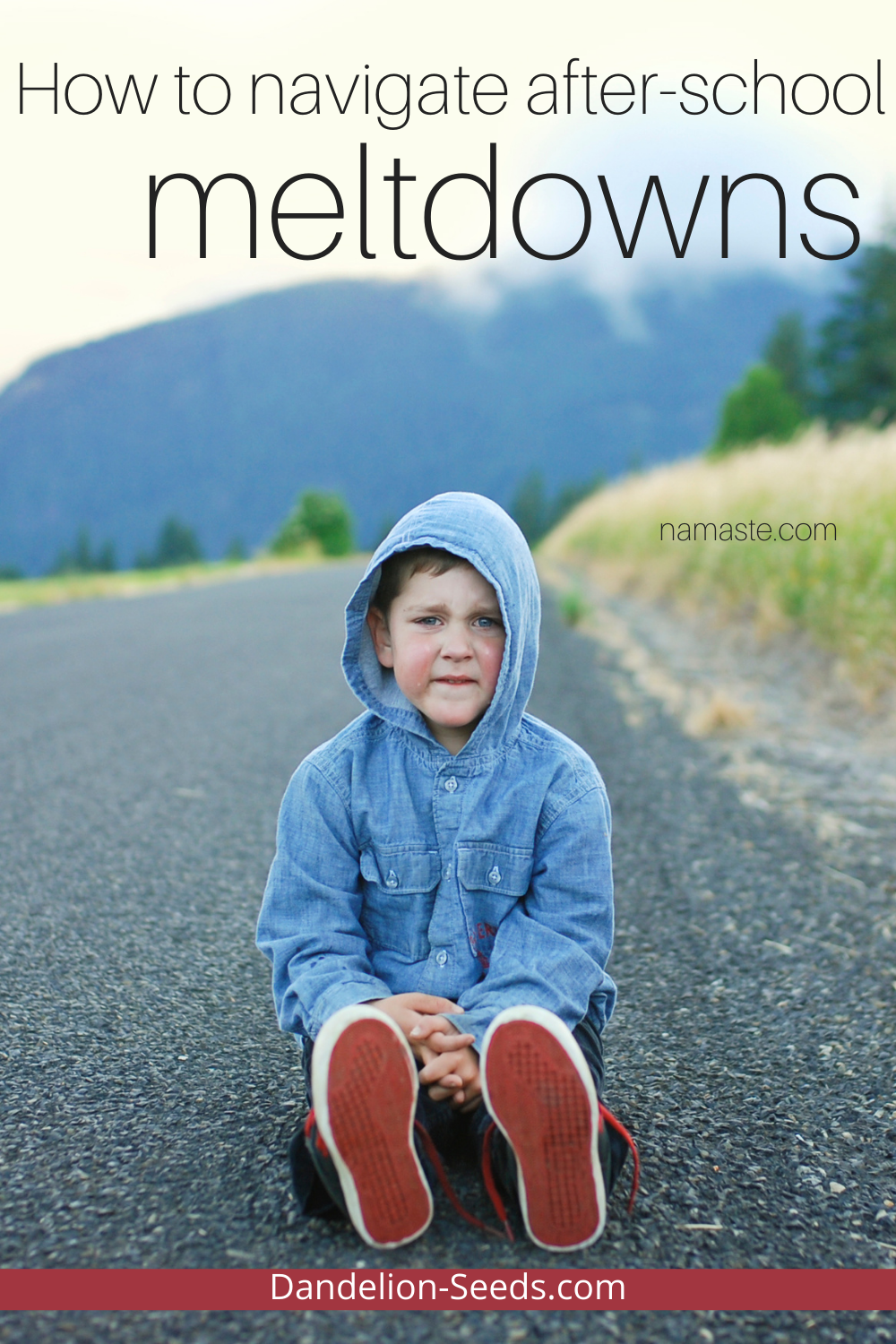
After-school restraint collapse is a meltdown that a child experiences after school, and specifically as a result of their school experience.
While the after-school restraint collapse can affect all kids, it can be more prominent in sensitive children with learning or socialization problems. Further vulnerabilities, like a lack of sleep, hunger, overstimulation, or sickness, may result in even the most even-keeled child losing control at home. (source)
Does this mean there's something wrong with your child? Are they TOO sensitive or do they have a "socialization problem?" Does it mean they hate school and you shouldn't send them back? Probably not at all. They're probably just overwhelmed and having a good old fashioned meltdown.
Having meltdowns doesn't mean children are regressing to the toddler years (unless, ahem, they're actual toddlers). It just means they're human, having big human feelings like every other person on Earth. We all get overwhelmed sometimes.
Because they're kids, though, they need some special support when they get home -- along with some specific tools to help them decompress.
For all children, school may or may not be a safe place emotionally. That doesn't necessarily mean that "unsafe" things are happening at school.
To the contrary, it simply means that school can be overwhelming, even for kids who absolutely love school.
However, unlike at home where children generally feel free to be themselves, school is about conformity. School is about obeying the rules; about being quiet; and not being disruptive in class. To a point, having a predictably calm learning environment is essential for learning to happen in a group setting.
As such, except at designated free times, children are generally expected to contain their energy and behave a certain way.
To be clear, I'm not dissing schools. In their defense, schools -- and teachers in particular -- are almost invariably doing the best they can with the resources they have. Still, there's a schedule to be followed. Adults often enforce certain rules with the intent of helping children learn and progress academically. Teachers simply can't slow down much when one or two (or more) children are waffling emotionally while the rest of the class is waiting. There's work to do.
What happens to all the children's pent-up energy, though? If they can't let it out through playing, roughhousing, and moving whenever and however they feel called to do, it has to go somewhere.
In many cases, children simply bottle it up and save it for when they get home.
School can sometimes feel like a pressure cooker with no release valve.
Kids need to decompress. Especially for the child who behaves well by the school's standards and you know is under a lot of pressure, we, as the adults, need to create a safe space for them to process what happens at school every day. If they don't decompress, it's a sure-fire recipe for upheaval.
Incidentally, these restraint collapse meltdowns differ from tantrums in some notable ways.
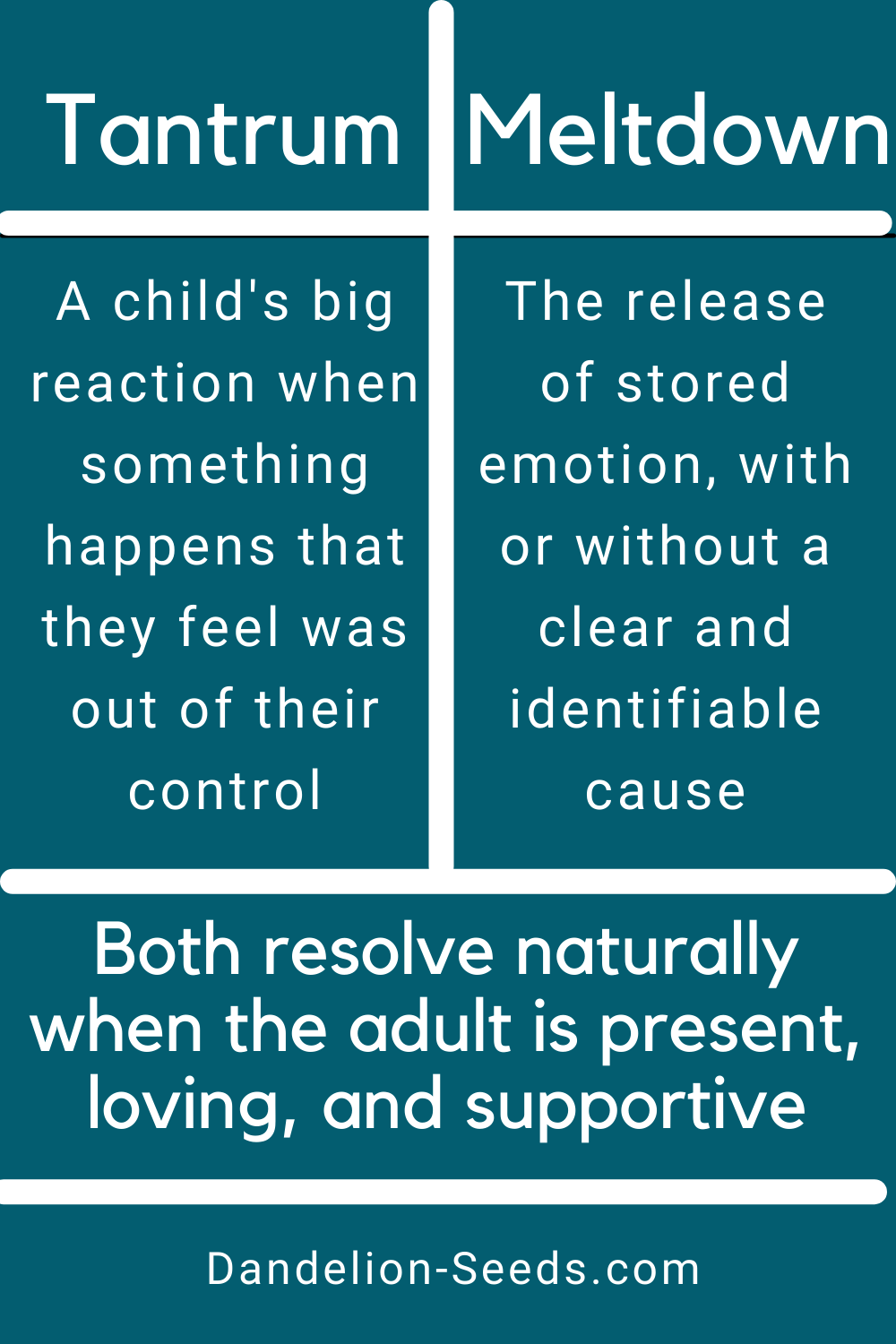
A tantrum is a child's big reaction when something happens that they feel was out of their control. They have strong feelings that things should've gone their way. It's often tried to a specific frustration.
Example of a tantrum: Your child has been mentally planning for a sandwich for lunch. You serve pasta. They express their displeasure loudly, perhaps seeming to lose all sense of self-control in the interim.
A meltdown is the release of stored emotion, with or without a clear and identifiable cause. It may manifest as something that seems small to the adult, such as the color of the child's cup -- but really, it's the proverbial straw that broke the camel's back. It's often associated with feelings of overwhelm.
Example of a meltdown: A child sits down to start their homework. Rather than happily starting in on it, they start to yell about the homework, not wanting to feed the cat, not wanting to take a bath, etc. Suddenly it feels like everything is wrong.
Parenting is hard when you're unsure where to begin soothing the child.
As a parent and parent educator, I choose to reframe the word "meltdown" as an "emotional release." I've never liked the term "meltdown" because, for many people, it ascribes a negative connotation with completely normal behavior. It's healthy to get our feelings out. We all need effective decompression strategies that support our mental health.
For children, crying and "acting out" are often their natural ways to connect with us. If we're responsive in supporting them, it reinforces to their brains that the world is a safe place.
That doesn't mean that all behavior is acceptable; but the expression of emotions certainly is. This is part of growing their emotional regulation skills. They learn that it's safe to feel their feelings.
Here are some specific steps we can take to support our kids and help them through restraint collapse.
The only things you can predict are that your kids will
...but there's no way to know in advance what that something is. Parents often naturally assume that when their kids get home, they'll be happy. As we know, though, that's not always the case.
Sometimes it helps to have a phrase to repeat to yourself before your child comes home. For example, "I wonder what my child will be feeling today."
In doing so, you bring yourself to a place of neutrality. You remove your expectations and set the stage for holding space for whatever your child may be feeling.
An overwhelmed child doesn't need to be rushed to the next big event. If they enjoy extracurricular activities and events, that's wonderful -- and they still need downtime. No child needs to practice "burning the candle at both ends" before they even reach adulthood; that only leads to future burned out grown ups.
Kim John Payne, M.Ed., speaks extensively about this critical need for balanced and planned downtime, including here in this recent interview. Even the busiest and most social kids need quiet time to relax and regroup.
What does this downtime look like? For some, it's time together outside in nature, walking or riding a bike; others just need some space to be alone and process. Still others want to talk and connect with you. Of course, they may feel different emotions day-to-day and their needs for support may change.
Perhaps the most important stress-busting tool to help them deal with stress in healthy ways every single day is the next point: play.
Kids spend all day at school moving from one highly structured event to the next, save, perhaps, for recess. When we allow more of it, though, here's what happens:
"Recent research suggests that children should experience twice as much unstructured time as structured play experiences and touts the benefits of unstructured play on whole child development including fostering social competence, respect for rules, self-discipline, aggression control, problem solving skills, leadership development, conflict resolution, and playing by the rules." (source)
When children don't have enough play time, their stress levels go up. It makes them suffer not only emotionally, but also physically (source). It then takes less extra stress to push them into meltdown land, so why not lower their stress by doing that which comes most naturally to them -- more play?
When your child gets home, I recommend you greet them with these three things:
For many kids, it's just plain hard to be away from you -- the person they love most in the world. Many people wrongly believe that after a certain age, separation anxiety should no longer exist.
In truth, we all miss our loved ones sometimes. Healthy separation anxiety, to some degree, should last forever. It means they care.
If separation anxiety is an issue, you can do several things to stay connected even when you're apart. Here are some starting points.
As Drs. Daniel J. Siegel and Tina Payne Bryson say, "Name it to frame it." Help your child name what they're feeling. Some kids may not even realize the "energy burden" they've been shouldering all day.
Some benefit from having a calm-down corner (which is NOT a time-out), whereas others prefer to co-regulate. Follow their lead. No matter their preference, the key message you want to convey is "You and all your feelings are safe here for as long as you need to express them." Being their rock helps create and/or reinforce their secure attachment to you.
Parenting is hard enough without us having to feel responsible for our child's after-school restraint collapse. Know that you didn't cause the restraint collapse; you're their safe person with whom to express it. Figure out what you need to feel peaceful regardless of whatever emotions roll in alongside your child.
When you can be their calm and know that you're their source of security and safety, this is what matters most. You're there for them. Keep showing up, and soon enough, they'll lean more fully into the peace they call Home.
Below is a partial transcript from Part 1 of my interview with Debbie Reber, author of Differently Wired (afflinks).
Watch the full interview here:
Hello. I am Sarah with Dandelion Seeds Positive Parenting and today I am so excited to talk to Debbie Reber, author of an amazing book for parenting in general, and specifically for differently wired kids.
This is the kind of book that makes me elbow my husband in the ribs and say, "You've got to hear this, you've got to hear this!"
We are both better for your work, Debbie, and I am so glad to have you here today.
Thank you so much! What a nice intro.
Let's dive right into the discussion of differently wired children. Let's talk specifically about getting to know the children that we have, not the children necessarily who we envisioned having long before we birthed or adopted them.
They don't always "look" exactly like what we envisioned they would. When parents learn their child is differently wired, how do they typically come to terms with the child who they actually have and are raising?
Is it intuition? Is it a diagnosis? How do we even come to know this child who we have?
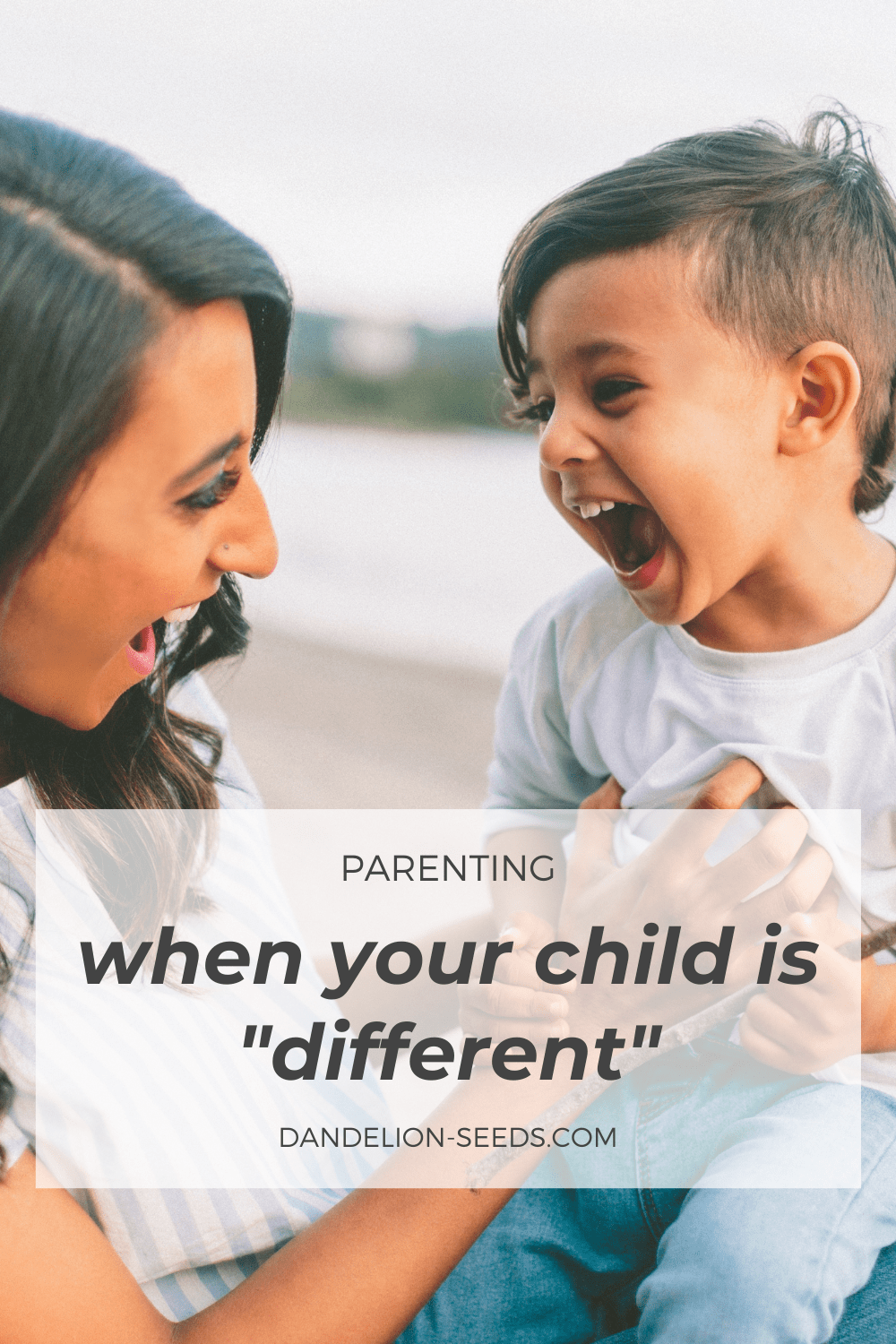
Well, it's a slow process for many of us. I describe it in the book like pulling off a Band-Aid® very, very, very slowly because a lot of kids fall under the "umbrella" of differently wired, as I use it, which is just being neurologically atypical in a variety of ways.
It isn't so obvious, and a lot of the differences are invisible.
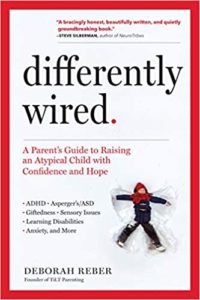
When they're younger, it may look like really intense behavior. A lot of us have kids who were colicky when they were little.
Just more intense -- the more kids like more energy, more movement, more emotions.
So we always kind of have a sense that, "Okay, this is a little more intense than I was envisioning and wasn't expecting it to be this hard." Perhaps those are thoughts that we might have.
And then over time, we start to gather more information, right?
We kind of intuitively may recognize something's going on, but we're also usually looking for evidence that everything's fine, which is always welcomed by us, right?
When we have little ones, we want someone to say, "You know, this is all kind of developmentally normal."
So, often, it's just piecing together information -- feedback from preschool and other teachers, which many of us start getting more and more of us are kids get older. And observations from other people.
And then we start asking questions. Eventually, many of us will go in for an assessment with an OT or with someone to start piecing together the information. But it's a slow process. And there's a lot of self-doubt, I think, that happens for parents as we're trying to determine, you know, is something going on or isn't it? Is this just in my head? - Debbie Reber, author of Differently Wired
[We wonder] are we being overprotective? Are we being helicopter parents? Are we paranoid? What's really going on?
Yeah, absolutely. And I love how you say that other people offer some of the insight that sometimes we're seeking.
We want to know, "Is our kid okay?" We want to know, "Are we okay?"
I know in my experience, I might have felt that something was different. This wasn't necessarily what I envisioned parenting would be, but it wasn't until another parent would come to me and say, "Oh -- is your daughter (and then she'd fill in the blank)."
I'd never even heard that term before. Let me look that up. And lo and behold, "Hey, that resonates. That makes sense to me. I think we have something to explore here." [Or no, that's not on target and I can release it.]
Yeah. I would say that most of my friends would often normalize what we were experiencing. It was very well-intentioned -- "You know, well, my child does this, too" or "This happened to us," and as a way to make me feel better, but that was more confusing to me.
And it was a friend, ultimately, I think when my son was four, when I was trying to explain some of the intensities and challenges we were having, she was the one who said, "Oh! That sounds like a sensory processing issue. You should read this book..."
That's when the light bulb went off for me for the first time. I was like, "Oh, there could be a reason for all of this," beyond just my husband and I not nailing it as parents. - Debbie Reber, author of Differently Wired
Yeah, absolutely -- because of course you were doing the best you could with the information you had.
Let's talk a little about our frame of reference.
Most of us grew up naively thinking that everybody was more or less 10 percent within the same range, neurologically speaking. Is it that we are simply more aware of neurological differences at this point or have children always been differently wired, and we just kind of said, "Oh, that child is just a busy child" or whatever.
How have the labels changed? How is the understanding changed over time?
I think the understanding has changed a lot. In raising my son and doing the research for this book, I reflected so often on kids that I went to school with back in the 70s and the 80s.
I was like, "Oh, oh my gosh, that's what was happening with this kid, and with this kid," and I I started realizing, you know, just kind of piecing it together. These kids who, back then, even something like dyslexia was not really talked about her understood.
And so it was really grouped on intelligence or the weirdos or you know, like we just had these kind of broad labels: the bad kids.
The kids who had no emotional regulation were just bad kids and they got punished or they dropped out of school. They went down that road.
And that really breaks my heart when I think about that and recognize, "Oh my gosh. So many of these kids had ADHD, or were on the autism spectrum, or had these other differences."
And so I think we're so much more attuned to it now.
Even from when my child was in early elementary to now -- he's 16 -- I feel like we're still evolving as a society and there's just more and more awareness, but it's been a long time coming.
Yeah, without a doubt, I had the same reaction you did when I think about the kids who I grew up with, also in the 70s and 80s.
It really takes me to a place of compassion and empathy and my strong mama heart wants to go and hug all of these little versions of these now adults, and say, "Now I understand. You weren't trying to be difficult or whatever label you may have had. We just didn't understand you. And as your classmate, I'm sorry I didn't know that about you because I would have loved to show up for you better."
Yeah, and so many adults are discovering their own neurodivergence through raising their child.
I actually did a couple podcast episodes on this where I interviewed adults who had realized they were on the spectrum or had ADHD in their 40s.
What does that do? There's a sense of relief. There's also a sense of sadness, right? And all those pieces fitting together and then realizing, "Oh my gosh. This little person that I was for all these years, and my needs were not being met, and this is how I internalized it. It's really challenging for a lot of people to reconcile.
It is. You know, and at the same time, to your point, a lot of these adults get to rewrite part of their stories. If an adult grew up thinking, "I'm just a tricky personality." "I'm just hard to love." "I'm just hard to be around." "I'm disruptive" -- all of the lies that they were fed as kids -- now they can say, "I did the best I could with the wiring that I had -- and look at all of the ways that I did learn to cope and to regulate and to exist in a world that wasn't necessarily built for me. Look what a superpower that was to get where I am today."
And I love how you had it from a place of empowerment rather
than a place of, you know, self-punishment or any of the negative things that parents could be doing. Now they're saying, "Hey, I've got this too, and now I understand all the better what my child might need."
Debbie: Yeah, a hundred percent. For me it explains the class clown label that I was given in the senior poll. "Best excuse maker." So that gives you a little sense of who I was in school.
Sarah: Awful, awful labels. Yeah, I was "most reserved" and I hated that one. This doesn't define us anymore, does it.
Debbie: Absolutely not. No. I'm still a bit goofy, but I'm definitely not a class clown anymore.
Sarah: Right there on the goofiness with you. That is an important element of success in today's society.
Debbie: [laughter] Yes. True.
One thing that I love so much about your book is that you don't limit "differently wired" to one specific medical diagnosis. You talk about a broad range of things -- ADHD, Asperger's, ASD, giftedness, sensory issues, learning disabilities, anxiety, twice exceptional, highly sensitive children, and various combinations thereof -- and that's not even a full list.
This is not a single, "Ooh, I can point right here and say that's what it is" and build our life around that. Many times these things coexist together.
So for the parent who is getting, be it a single diagnosis or some combination of these things, how does the parent keep from getting totally overwhelmed?
And what does the parent do with this information once they have it?
I think labels are so tricky and I certainly talk a lot about them. I've thought a lot about them.
Labels can be super helpful as we're getting information because it can give a context for things that are happening with their child. It can open up the door to services or accommodations or other types of support that we need for our kids, especially, you know, legally, depending on what the diagnosis is, but they don't actually solve anything.
I used to really want the label because I wanted an answer, right? I wanted to know this is what it is and I wanted the answer so I knew exactly what to do to fix it.
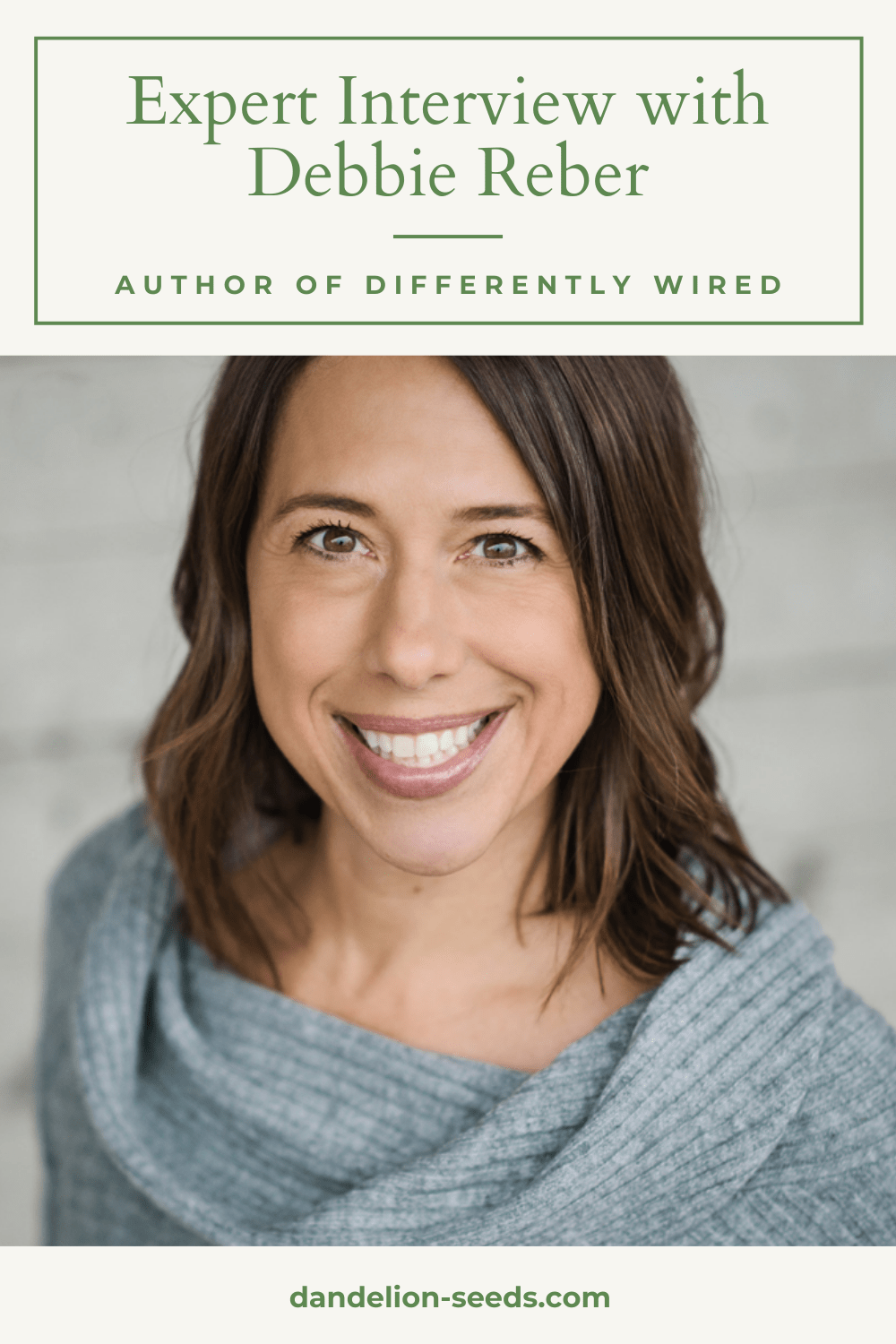
And I think that's what so many of us, especially when we're earlier on in this journey, we want an answer to explain what is challenging in our lives and ultimately, a label -- well, I can give you some insight into a course of support or areas to prioritize your support on.
But [a label] doesn't change who your child is and isn't -- there's no playbook, like, 'Do this, this, and this and that will fix or solve for all of these symptoms.' - Debbie Reber, author of Differently Wired
So I think that they're tricky. In Venn diagrams of differences, you'd see so much overlapping between, you know, profoundly gifted, ADHD, and autism spectrum, for example. Sometimes they could fit into any of those buckets.
What I like about the term "differently wired" -- it's not a medical term, obviously, but it's a positive term that parents can embrace and hopefully reframe what could be seen as a negative or a deficit or a problem that needs to be solved. Instead, it's about an understanding that my child's brain isn't considered neurotypical; and my child is a unique thinker; my child's brain wiring is is outside the box and that's okay. - Debbie Reber, author of Differently Wired
It's a difference.
And so I really love that language as a way not just to feel more positive and optimistic. But also, when we are honed in on this one little diagnosis, we're very narrow in our vision. I feel like societally, that keeps us marginalized because we're all in our own little buckets.
And so we can talk about well, it's not that many kids who are dealing with this, or it's only this percentage of the population has this issue so it keeps them all "problems."
But when we expand and more inclusive and say actually there are so many people whose brains are not considered "normal," we have to accommodate for that.
We have to take a step back and look at what are we really doing in terms of how we're educating kids.
We're educating to a majority that probably isn't even a majority. I think that differently wired kids make up more than 50% of the population if I were to put money on it.
I agree wholeheartedly and I love how you reframe the labels. So much of our ability to come to terms with who our child is, is to look at them in a positive light, you know?
I often talk with my clients about reframing a tantrum as an emotional release. It's the same thing, but it really feels different if we look at it as this is a healthy expression of emotions.
The same is true for what you said. If you have a child whose brain simply differently wired, that doesn't make them less worthy of love, compassion, all of the gifts that we have to offer as parents -- and also as a society.
[And I agree that the numbers of differently wired kids are much higher than what's typically stated.]
Related expert interviews: The Explosive Child, Highly Sensitive Children, Childhood Anxiety
You also said another word that I want to go back and highlight for a minute. You talked about our desire to "fix" our differently wired kids. This reframing really helps us reframe the need to fix our kids, too, doesn't it?
Yeah, because fixing implies that there is a problem or that there's something broken. And that is because we are holding up our kids to a neurotypical standard. We're suggesting that there is one way of "being" that is acceptable and normal and okay and everything else...well, and in order to to fit into this "normal" bucket, all of these issues have to be fixed or addressed.
That does such a disservice to so many people. Again the 'normal' side of people -- there's nothing 'normal' about it.
The mental health problems [people have] and the ways that people compensate to get by in society -- and those who struggle with so many things like executive function and paying their bills and being organized and running a household -- all of those things -- everyone's making it up as we go along right? There's no one gold standard. - Debbie Reber, author of Differently Wired
And so this divide, and thinking that these other people aren't somehow broken, it just really does such a disservice. It implies that they're not okay in who they inherently are. To give a child that message is just heartbreaking to me.
It is. And it doesn't have to be that way. We can reframe it, and it is on us as the parent to say, "I'm going to change the narrative, not only for my child but also in the narrative that my child shares with those around them as they grow up, too." That's so important.
Let's talk a little bit about fear. One of the most common themes that I hear from parents is fear.
Suddenly, they're raising a differently wired child who may not feel at all

familiar to them -- or perhaps feels very familiar to them. Either way, it's a little bit scary sometimes as a parent, wondering how we can best support our child.
How can parents move from a place of fear to a place of trust and growth in parenting their differently wired child?
I think that it's really important to to know that fear is part of the human experience. It's part of our inner self trying to protect us and keep us safe.
We don't want to make fear [of raising a differently wired child] to be a bad thing. We want to have a relationship with it. We want to see it for what it is. - Debbie Reber, author of Differently Wired
I encourage parents to get really open and honest with themselves about investigating what things they're really worried about. What are their biggest fears?
They're often about this unknown future. Because the path is very unclear and not laid out before us, and the way that we assume everyone [else is] raising a neurotypical kid.
Related guest post: One Mother's Journey of Raising an Atypical Child
And so yeah, when we're kind of spiraling out of fear about future unknowns and all of those things, and "Can I do this?" and "This is going to be hard" and all the things that we do -- yeah, we run into problems. And we're not parenting from from a place that would really most benefit our kids.
Understanding what those fears are, questioning those fears, and choosing love, you know, I talked about choosing love and possibility.
I love that quote by Neale Donald Walsch: "All human actions are motivated at their deepest level by two emotions--fear or love."
When we start to understand what making a choice from fear feels like in our bodies, like usually know we're doing it. Our gut my may be saying, "This is the wrong move, Debbie" but in my head, I'm like, "But X, Y and Z."
So we're living in our heads and not our bodies.
So, if we can start to tune in more with our bodies and and parent from that place; make choices from that place, we will start getting feedback that that was the right choice to make. It'll feel lighter. - Debbie Reber, author of Differently Wired
It feels scary. I'm not going to say it's not scary, but it'll it'll feel like a lighter choice or we'll start to get feedback that the results are, "Oh, that was the right decision to make." And it's kind of like a muscle that that we're building.
I think, again, we have to uncover the fears of raising a differently wired child and acknowledge their existence; make some sort of uneasy alliance with it and then keep pushing ourselves to choose love and possibility instead.
See more from Debbie Reber, author of Differently Wired:
We've all been there. We're sitting nose-to-nose with a human much smaller than we are, and we're simply not connecting. We want x. They want y. And neither of us is budging. We want to be peaceful parents, but it doesn't always come easily. In moments like these, might playful parenting be the key?
If "play is the work of childhood" (a quote by child psychologist Jean Piaget), then playful parenting is the best way we can work with our children. It's the absolute key to cooperation. It's speaking in their own true language; the language of their hearts and minds.
Children play "rain or shine"---it helps them decrease stress, learn new things, and figure out the world (source). The time we invest in playful parenting helps us connect with our kids, while also helping them feel emotionally safe and understood. That, in turn, makes our job as parents easier.
We want to enjoy our interactions with our children. If we focus on "getting" them to do things, the relationship becomes about power. Instead, I'd encourage parents to work alongside their children as partners against whatever problems they're trying to solve.
Playful parenting embodies what positive parenting is all about; working with kids rather than against them. Being a playful parent signals to a child that we're on their side—we're in this life together.
We can connect and be close without power struggles.
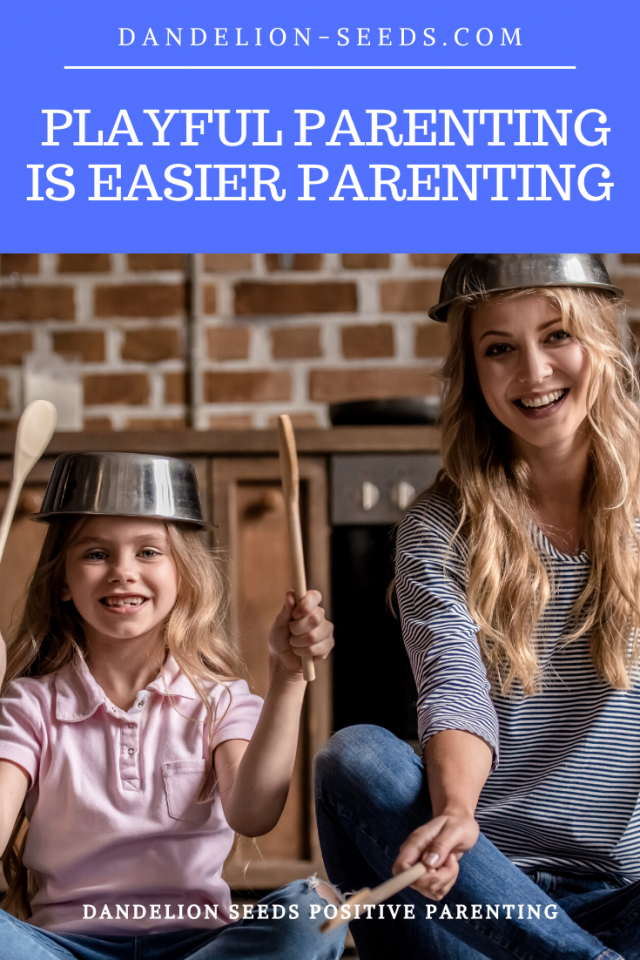
These playful parenting tips below work especially well for ages of 2 - 8, but versions of them can continue well beyond these years.
An important note to remember is that playful parenting works best before emotions have escalated. If the initial engagement with your child is positive, it's the surest way to maintain a sense of peace in your home. As they say, "An ounce of prevention is worth a pound of cure."
Playful parenting certainly can work retroactively, however. Perhaps our first attempt at talking with our child didn't go over so well. Make space for the child to become emotionally regulated again, then try a fresh start.
One fun way to accomplish this is to feign total incompetence. As you approach your child with her hairbrush, say, "Open wide! Time to brush your teeth!" Similarly, holding the toothbrush, say, "Oh, this will make your hair so fancy!"
Your child will love the feeling of power and total competence as they point out the error of your ways. You, of course, will be shocked to learn your mistake. With exaggerated hesitation, you will agree to try it their way for a moment.
After a minute (especially if they start to protest), add, "That's right! I use this on your ARM! Arm, be still." Use it near your own arm if need be. It's okay to go back and forth a time or three to get it done.
Try to trust your child's body and timing here. If they need help remembering to check, however, make it fun. Maybe they're climbing onto a choo choo train. Perhaps it's a rocket that's about to blast off to a new solar system.
Do YOU, parent, fit into that 3T sweater? Please try. If your child isn't keen to get dressed, a bit of laughter clears the air and helps you connect. It's worth the time to slow down and be silly if it cancels the 45-minute tantrum that might otherwise ensue.
Another great way to accomplish getting your child ready for the day is to involve the stuffed animals. They're your allies. Can your child dress a doll while you're putting on his socks? Can your kiddo tell you what his animal friend needs to wear for his rainy day, and what he might need to do to match him? Get your kids outside their heads here. Involve them in care taking.
It's important to remember that once you have children, it's normal for your home not to look, well, like it used to. That's okay.
You might walk into a room and see a mess, but your child sees a world of possibilities. Allowing for some "mess" might be one of the best gifts you can give yourself stress-wise.
When it does start to feel overwhelming, however, cease talking about cleaning and all that "responsibility" rubbish (child view). Your child will inevitably pick up on any anxiety you convey around cleaning. For everyone's sake, work to make it a peaceful and lighthearted process.
Since this is a common trouble spot, I'll share several ideas of how you can incorporate playful parenting into this sometimes tricky topic.
The key idea is this: Changing your nomenclature helps tremendously. Use kid terms. Not only enter, but lead, the world of make-believe.
When you see a bunch of toy cars all over the floor, notice the incredible traffic jam. The drivers need help getting back to their proper parking garage (the toy box)! "Drive" them back together. Sound effects help.
Building blocks have somehow scattered across the floor and need to make it back into the bag? No problem! You're not holding a bag; you're holding the HUNGRY MONSTER. "Feed me!" it bellows playfully. "Hungry! Must eat blocks! More! More!" On it goes until the mess is gone.
Get creative. If something doesn't have a logical "home" (like cars in a box you call a parking garage), make it silly. "Let's put all the dolls in the tree house [on the shelf] for the night!" Even a paper bag can be a "tent" for something. Bring toys and their storage spaces to life.
Lastly, remember how incompetent you were at brushing teeth and hair? You're even worse when it comes to picking up the toys! A ball? It weighs as much as a semi truck! How in the world can you lift it? Can someone save the day? (Many children love to rescue adults.) That giant toy elephant, however, is a breeze for you---it's light as a feather.
Your superpowers are very confusing---and hilarious.
Although I often shy away from competition, this is the one time I'll offer a race. Who can put on shoes the fastest and touch the doorknob? For some kids (particularly highly sensitive children), however, competition can cause anxiety, so use it with caution.
Would anyone like to hop to the door like a bunny? Roll across the rug to get there? Be carried and spun in circles? Sometimes a different mode of transportation is all they need.
If your child can help put away non-breakable items from the dishwasher, for example, let them try. A great question to ask (even if they've done it before) is "Do you think you're strong enough to move these cups from the dishwasher to the counter?"
Children love feeling competent. So much of their existence includes not knowing what to do, so when they feel capable, it's incredibly empowering for them.
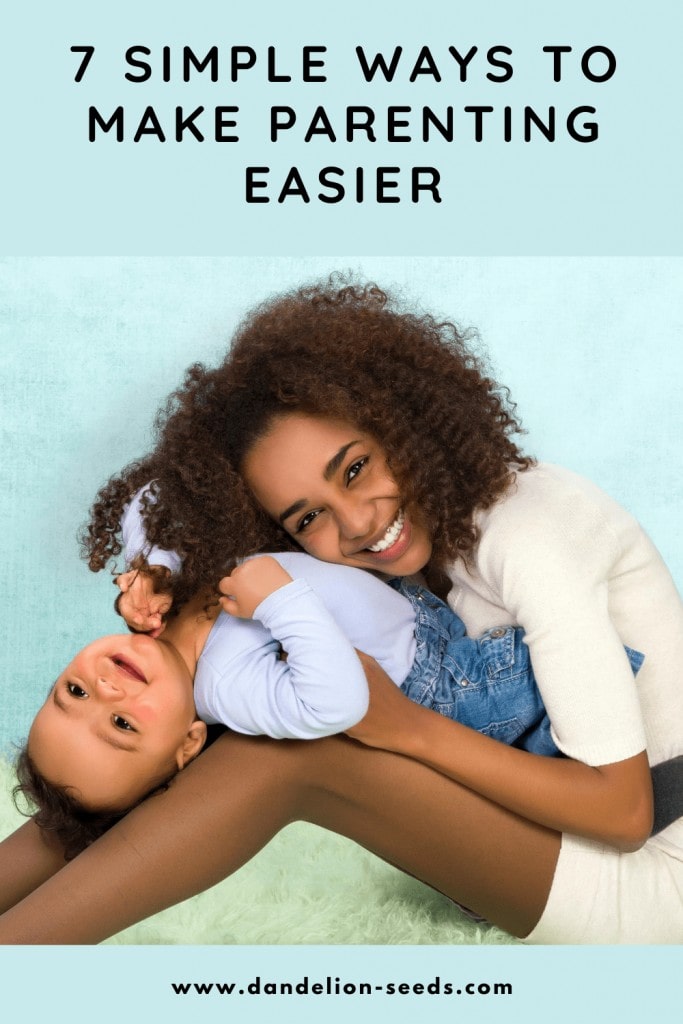
If your child is struggling with a particular task that involves his or her body, for example, talk to the body part directly through playful parenting. Let's say a child is handling the family dog too roughly. One option is to remind the child what to do in simple terms: "Gentle hands, please." This lighthearted and clear approach often works well.
A playful parenting modification would be, "Excuse me, hands? Yes, all 10 fingers -- wiggle your way over here, please." Rather than looking your child in the eye, look at, speak to, and gently touch your child's hands as if they, alone, are the offending party.
This works particularly well for sensitive children who might feel embarrassed about what's transpired, or who have a tough time with correction.
You continue, "Dear hands, I could really use your help here. Our dog needs gentle hands only. Here are some things you CAN do. Would you rather play a game, do some clapping, or wave yourselves up in the air?"
Playful parenting gets the "correction" done in a lighthearted yet still entirely effective way.
How does it work, though, for adults who aren't as naturally playful as kids are? Our brains are wired quite differently from theirs! As we know, kids can have fun playing with parents, friends, and even cardboard boxes. Not all of us have been to comedy school -- do we have to be naturally funny?
Not at all. In short, we can meet our kids where they are in their play. Join in and see what they're doing. Opportunities for playful parenting often present themselves naturally if we enter our children's world of imagination.
Example: Let's say your child is busy playing castles and dragons / dress-up. However, it's time for dinner. Rather than making them disengage from their play, roll out an imaginary red carpet and march to the table together. Or, climb into their invisible chariot that takes them to the banquet hall for the royal feast.
We don't need to manufacture something new and creative to make playful parenting "work" for our kids. We just need to let our guard down a bit and, to the extent that we can, see life through their lens for a little while.
I'll speak more about this in an upcoming course (details forthcoming).
This is parenting for connection; parenting for the relationship not just for today, but also for the long run. Sure, if you're new to playful parenting, it might seem to take more time "in the moment." Ultimately, however, it can spare your family buckets full of tears and be entirely worth the effort.
Oftentimes, after some practice, cooperation happens so easily through play that it's faster than any other alternative.
As a side bonus, you might be surprised how self-sufficient children can become after they've learned how to do all these things in an emotionally safe place with you---and they feel connected. Studies show that secure and healthy attachment actually foster greater independence in the long run (source).
Playful parenting is a wonderful return on your investment. Long-term connection starts when kids are little. It has a compounding effect--it grows over time, decreases conflict, and increases trust.
Being a playful parent is a part of the equation that fosters connection for many years to come. It's all about relationship.
This post contains affiliate links. As Amazon Associates, we earn from qualifying purchases. Your purchases help us support important charities.
The Highly Sensitive Person (HSP) may be relatively new as a namesake, but it's certainly not new as many people's reality. Some of us are just wired differently than others, be it from nature or nurture (although in this case, science argues for both).
With our sensitive wiring in mind, those of us who become parents need to learn parenting strategies that are not only effective, but also keep us from feeling overwhelmed by our children--the very people whose care has been entrusted to us.
Personally, I know the HSP life well. I'm the daughter of a highly sensitive person. I, myself, am an HSP. And now, I have little one of my own. I write this based on years of research as well as from my own experience. In other words, I "get it."
My hope is that my research will help the HSP parent find greater peace in their parenting strategies.
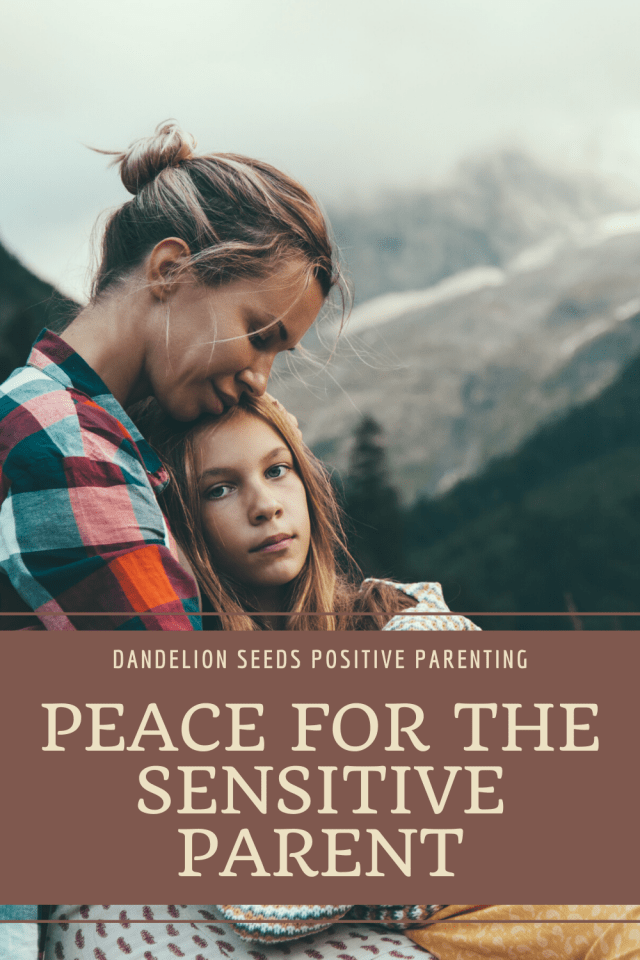
In short, MRIs show that the HSP has a nervous system that works differently than that of the other 75 to 80 percent of the population. However, HSP traits don't necessarily manifest the same across the remaining 15 to 20 percent of the population that we comprise.
What science does demonstrate across the board for the HSP, however, is that our MRIs show distinctly different areas of brain activity versus non-HSPs in response to the same stimuli. Specifically, the MRIs show "stronger activation of brain regions involved in awareness, empathy, and self-other processing" (source).
As a result, HSPs can experience the same events entirely differently from non-HSPs. And empathic HSPs take their innate sensitivity a notch farther.
That said, there are a couple of concepts worth noting before addressing parenting strategies: "Highly sensitive people are typically introverts, while empaths can be introverts or extroverts (although most are introverts). Empaths share a highly sensitive person's love of nature and quiet environments, their desire to help others, and their rich inner life." (source)
We can use what we know to our advantage.
While mainstream parenting is, well, mainstream, we simply aren't. Therefore, we can't expect that standard parenting strategies would work well for us. If we try to fit into a certain "box" that doesn't reflect our sensitive nature, parenting might feel harder than it has to be.
Some of these ideas can lighten your load.
Many of us have what feels like a whole lot of extra neurons dedicated to empathy. And HSPs, following a standard rote of discipline that leaves us feeling disconnected from our children simply isn't a good fit.
Parent gently. This includes "parenting" yourself, too. Be kind to yourself and keep your inner (and outer) voice in check.
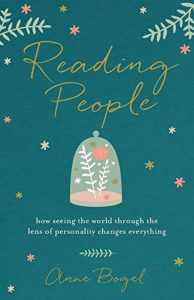
If HSP parents treat our children harshly, many of us will internalize the punishment and feel it ourselves on some level. If our parents were harsh with us or ignored our big feelings and we have emotional memories of that, we'll feel those feelings all over again as we administer them in our own homes. That doesn't feel good.
Of course, children do need loving limits. With practice, we can hold those loving limits compassionately with our children while also healing your own inner child.
If you're new to gentle parenting or want to learn about it in ways that support the information in the books, many positive parenting groups exist to support you. Support from likeminded parents can help you navigate to a gentler way of being.
Release the pressure to discipline the way our parents did, or our peers did, or the way some outdated parenting book said we should.
Trust your sensitivity to be your ally and your guide.
We all know we can't pour from an empty cup. We'd like to be able to take care of ourselves first. However, some HSPs find it challenging to find parenting strategies that balance self-care and our tendency to put others first.
For me, taking care of myself first just wasn't always my reality. When my child was very little, I couldn't just let her cry and "figure it out," no matter how exhausted I was. Despite the well-meaning (albeit unsolicited) advice from others, I let my heart lead my parenting.
I'd felt better if I'd parented lovingly and while being emotionally present for my child day and night.
Does that mean that I just abandoned my needs, though? Absolutely not. Something that worked really well for my family included reducing screen time and replacing it with story time. We also instituted screen-free days with unexpectedly positive results. That wouldn't work for everyone, of course, but I knew I needed my quiet time to recharge.
So, I created the best of both worlds: quiet and clutter-free areas around the house where I could go to read with (or near) her while still staying emotionally present.
I also made mornings our standard time to get out of the house. That way, I knew I could come home and everything would be quieter from that point forward in our day. Afternoons became a predictably sacred space for us.
"Home days" earned just as much priority as other appointments. I consciously worked to find the patience for positive parenting, knowing that practice would make our inner lives more peaceful. If I couldn't "go" to self-care, I brought peace to meet me where I was.
Many HSPs grew up keenly aware of their sensitivities to sounds, bright lights, and overly gregarious people. Whatever external stimuli triggered you before having kids, they're likely still there, along with the responsibility to raise children despite them. And in many cases, kids are all the noise, lights, and excitement wrapped up into little human-sized packages of energy. That's standard child behavior.
That said, this is in no way a knock on children. They're perfectly good at being exactly who they were designed to be, lights and all. Life moves on, as they say, but becoming a parent doesn't mean you're not yourself anymore. Suddenly, you're responsible for raising a human who might challenge all of your HSP-ness.
Remember how you grounded yourself before you had children. What's something you haven't done in so long that you've nearly forgotten about it, but that helped you find peace?
Consider journaling as a way to reconnect with yourself. It's proven to be a solid and reliable way to express
our own big feelings and working through them peacefully (source).
If you have an understanding partner, share your heart with them. A friend or a counselor can be a wonderful resource for an HSP, as well.
If you don't have a good circle of friends, create your community -- start somewhere. If you lack childcare or the desire to leave the house, connecting virtually can still lift you up. A video or phone chat with a faraway friend does wonders for refueling the emotional tank.
Within certain parameters, even social media can offer some benefits specifically for introverts, including the HSP. Connecting with other adults is easy to overlook because many don't consider it a "parenting strategy." However, connection is critical to our emotional wellbeing.
Connection, in turn, contributes to the emotional fuel we have on reserve for the challenging parenting days---and for all of the regular days, too. If social media starts to creep in too intrusively and negatively affect your relationships, however, know that there are many things you can do to keep your screen time in check.
Finally, not all connection needs to be with people. Connect spiritually. Connect with nature, too -- science shows how beneficial it can be for grounding ourselves (source).
Rather than trying to fit into a mainstream mould that wasn't built for us in the first place, we get to create our own parenting strategies that honor who we are. We can create an approach that 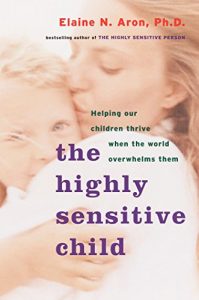 leaves us feeling encouraged and connected, even despite all the ways that parenting stretches us and pushes our boundaries.
leaves us feeling encouraged and connected, even despite all the ways that parenting stretches us and pushes our boundaries.
With the natural bigheartedness of HSPs, our children will fare better when we embrace that which comes naturally to us. There's always room for more compassion in the world.
There are a few really detailed and exceptionally good books to study, such as The Highly Sensitive Person by Elaine Aron, PhD, and Reading People by Anne Bogel (the latter is only a chapter, but it's entirely relevant). I 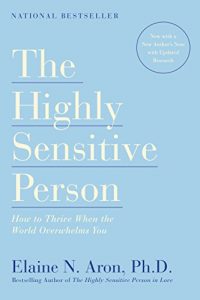 recommend them to HSPs who want to understand themselves better. They're also beneficial to non-HSPs who want to understand us better.
recommend them to HSPs who want to understand themselves better. They're also beneficial to non-HSPs who want to understand us better.
You can watch a movie about highly sensitive people. You can even take a online quizzes to gauge whether you're a likely an HSP. If you've read this far, though, you probably already know the answer.
I didn't need a quiz or an HSP "label" to understand my own wiring, but it didn't hurt to know what to call it so that I could research beneficial parenting strategies more effectively.
With or without a quiz, if you understand yourself to be an HSP and want parenting strategies that support you, check back here for more resources soon -- including an online session dedicated to parenting a highly sensitive child.
I get what it feels like to be a lonely mom. Having moved house an average of almost once per year for the first six years of my child's life, I've spent a lot of time trying to make new mom friends. Or any new friends at all, really, regardless of whether or not they're mothers. Some days I'd have settled for a friendly looking giraffe on a cereal box.
Truth be told, besides being lonely, I also spent a good percentage of time back then feeling really discouraged, often alone in a house with a child who was mostly too young to carry on a conversation. Unless you wanted to talk dinosaurs. She had that covered.
My husband was working ridiculous hours at the time. He was often out of the country, so I was married, but largely living a single parent life. (Yes, I realize it's not the same as actually being a single person, and I'm not suggesting it is. I was raised by a single mom and know that life well.)
It didn't help that we had no family within roughly 1000 miles.
Living in a big city, I was surrounded by other humans, but I had no sense of community. My loneliness was fairly profound nearly all the time for those early years.
I knew that many moms feel lonely sometimes, but after having moved and "starting over" so frequently, there was no Ethel to my Lucille Ball; no Betty to my Wilma Flintstone. Where was the magical next door neighbor (with playdate-compatible kids) who I was supposed to find, anyway?

As a stay-at-home mom, was I supposed to walk up to random parents in the grocery store and offer, say, a good looking lemon in exchange for an hour of coffee together? I'd be lying if I said I hadn't considered it.
The more we moved house, not to mention moves to new cities, the more tired I was of feeling "empty," longing for someone to hang out with who was, ideally, more than two feet tall.
An unspoken, but very real, part of motherhood is that it can be one of the loneliest times in our life.
As it turns out, I wasn't alone in my emotional isolation. Being a lonely mom is common. Whether your children are newborns or older, loneliness can affect moms at different times of our lives. Let's explore what's going on here---and then continue with a message of hope and encouragement.
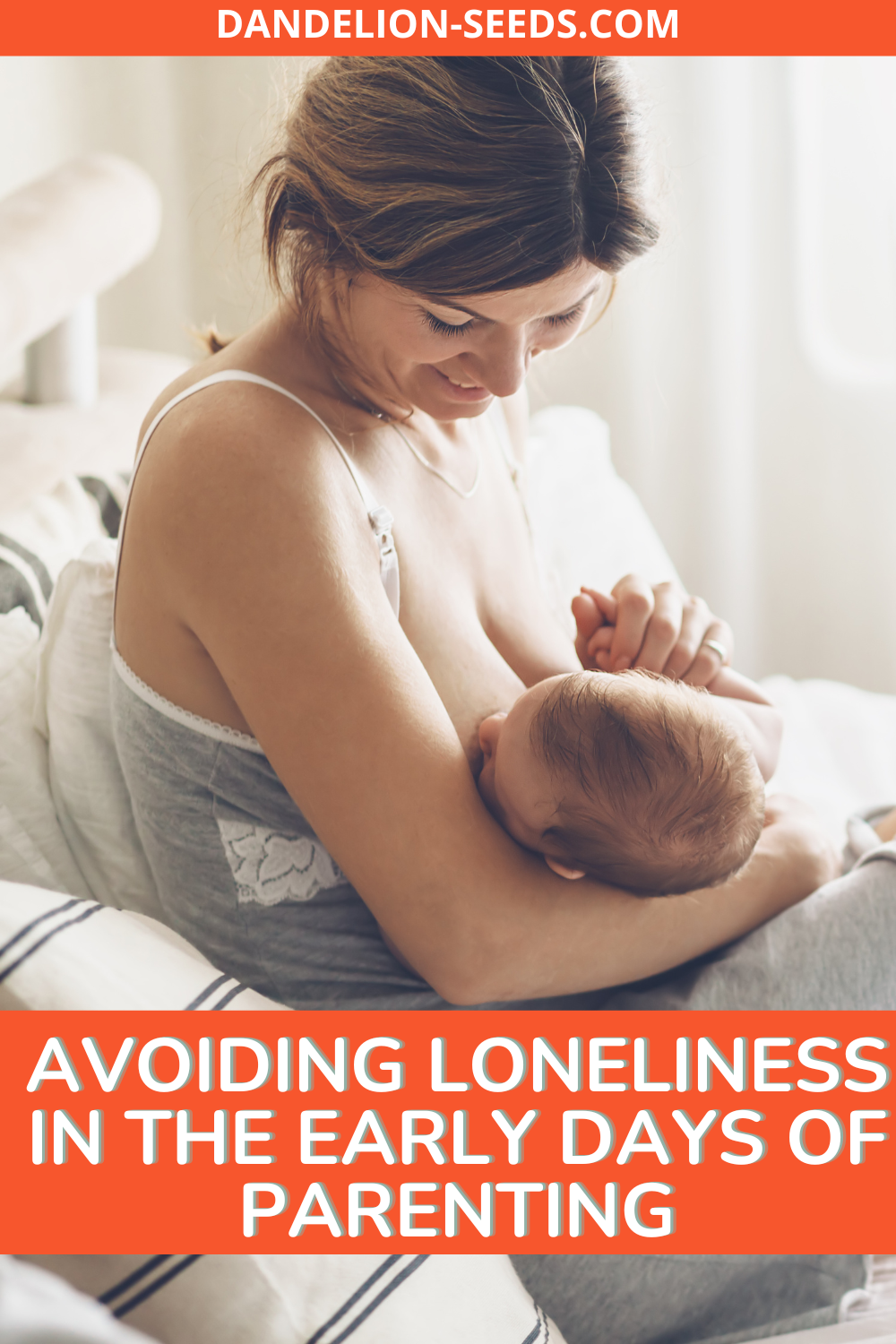
Research demonstrates that motherhood can be lonely:
...28% of new mothers experience loneliness after giving birth to their first child (AXA Healthcare, 2015). Given that becoming a mother is typically characterised as a time of positive emotions, it is perhaps surprising that this figure is in line with the highest estimates for the percentage of adults of childbearing age experiencing more than occasional loneliness (Qualter et al., 2015). (source)
Further, research demonstrates that exhaustion and self-inflicted pressure to be a "good mom" can add to our feelings of being a lonely mom (source). We try so hard to be everything we can be to our baby, child, and husband or partner (if we have one), yet aside from endless games of peek-a-boo, there's often little fun to offset the difficult and ever-present feelings of loneliness.
Moreover, people who are physically or emotionally exhausted can exhibit measurable symptoms that may feel like depression (source).
Stay at home moms or moms without regular support may be particularly vulnerable, although it can affect anyone lacking meaningful social connections. As of 2021, approximately one-third of parents reported feeling lonely (source).
Related: Expert interview with Dr. Sarah Bren about being "good enough" parents, or mini-course: Tired Mom: A Better Way to Manage our Time and Lower Our Stress
New moms, in particular, often struggle with feeling lonely in the brave new world of motherhood. It's all foreign to us, and lacking a so-called "mom tribe" can feel especially isolating while we're figuring out ALL the things.
Especially in new motherhood, mental well-being can suffer significantly.
It goes without saying that there's a tremendous physical toll the early days of parenting on the body (after all, if your child is biologically related to you, you're recovering from having birthed something the size of a watermelon).
On top of this, most new moms report feeling the "baby blues." A notable percentage thereof go on to experience postpartum depression (PPD) or postpartum anxiety (PPA) (17.9% and 13.8%, respectively) (source).
I was a lonely mom, and I was also a mom with PPA.
No one tells us these things about motherhood before we sign up for it; at least, not in terms that seem meaningful at the time. Even if we're told we may feel isolated, it really doesn't hit home until new mothers are spending entire days (and nights) in a continuum of changing, feeding, rocking, and supporting our babies' physical and emotional development.
Although PPD and PPA don't cause the loneliness many moms feel, they certainly wouldn't make new life with baby feel any easier.
Of course, if you're living with PPD or PPA, it's important to address it with a professional and allow yourself to heal. You don't have to (and shouldn't) "tough it out." Help is available, and these days, many treatments are available that may not require medications, if that's a concern.
It can truly be exhausting and overwhelming. Anxiety for the lonely mom is commonplace when it's all so new.
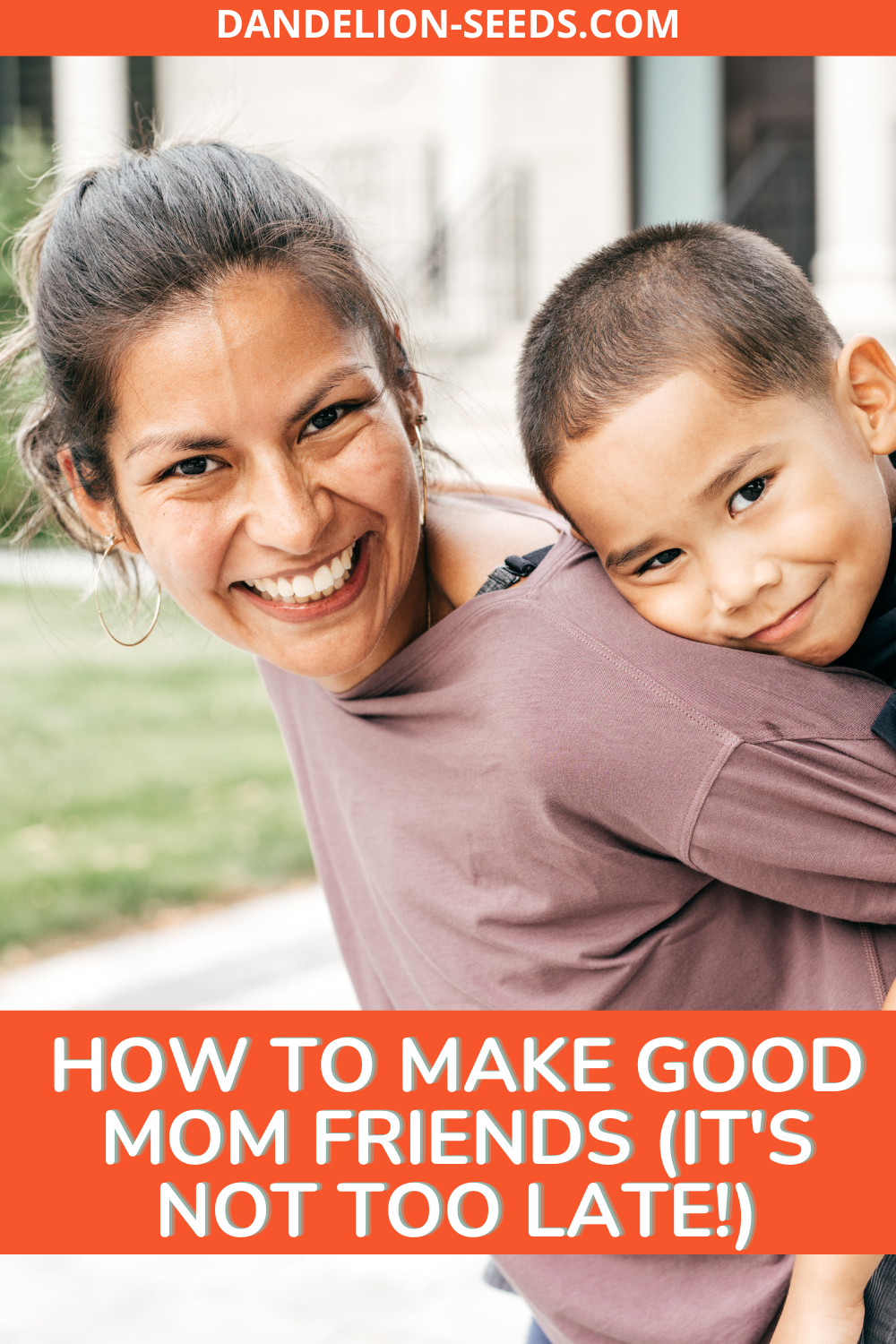
Loneliness in "middle age," once the children are bigger, is common, as well. This is due to a number of factors, not the least among them is that we're often so busy keeping up with our children's busy-all-the-time lives that we simply lose track of our own needs.
We may be surrounded by family and have plenty of people to talk to at home or otherwise, but we may be lacking deeper connections (source). Talking with the parent of a child's friend in passing at a soccer game simply isn't the same as talking with a person who's deeply invested in your well-being.
Without at least one friend on whom we can regularly rely to remind us that we're fun, interesting, and amazing can take a toll on our self-worth. Self-care may go out the window, too, so we're often left feeling pretty empty. As many as 78% of moms say we put off taking care of themselves because we're too busy caring for others (source).
In such a state, who has free time to start connecting with a group of women who magically happen to be in the same life stage?
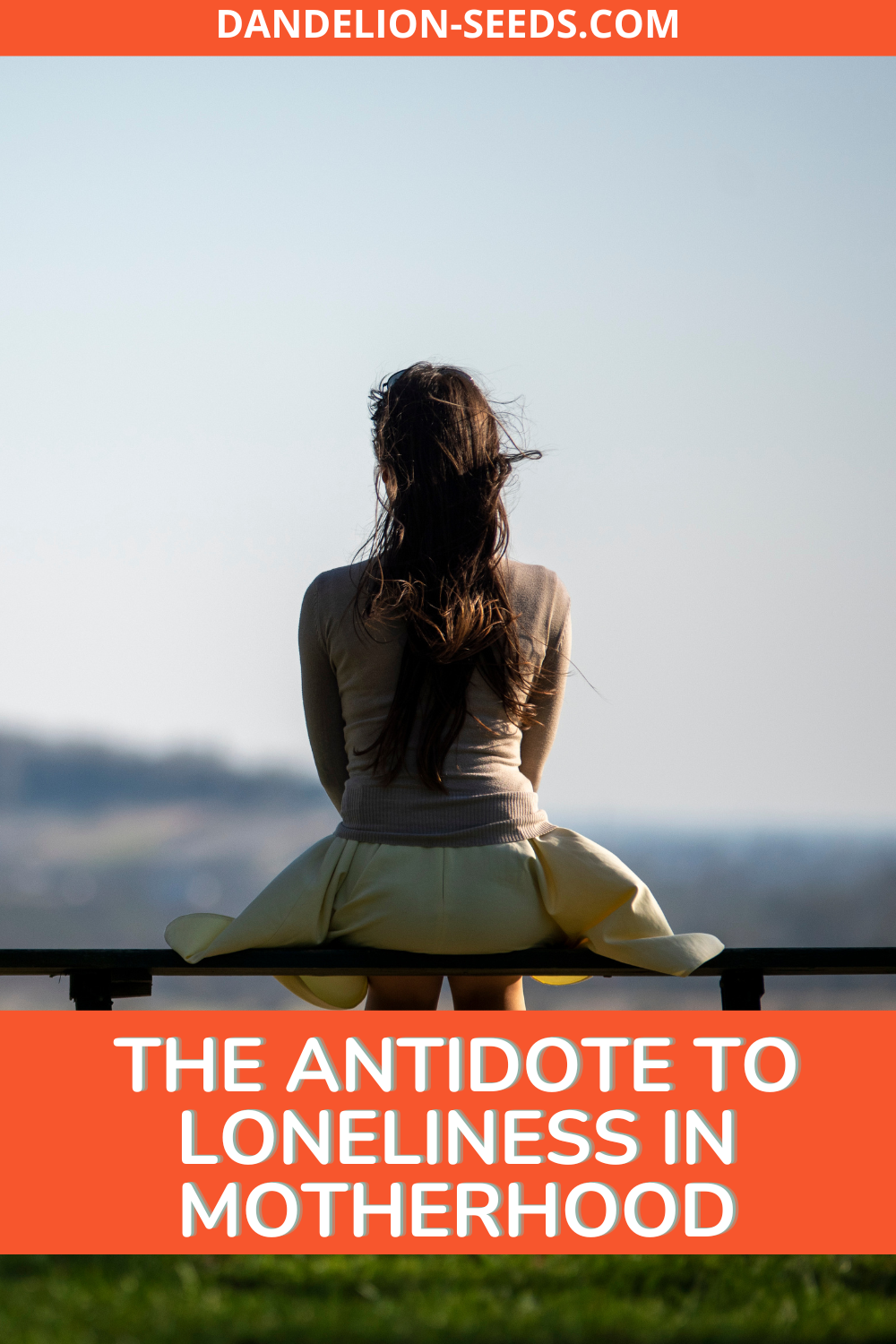
Even if you're lacking energy, know-how, or confidence, the most important thing to know as a lonely mom is that there are ways to come out of loneliness. You're not wrong for having invested in your family. It's just that you get to matter, too.
Know that everyone feels lonely sometimes. That's normal. Staying a lonely mom, however, isn't healthy, so we can do some productive and specific things to combat loneliness.
I get it. "Self-care" feels cliché at best these days. As stressed and/or lonely moms, we're tired of being told we're wrong for not prioritizing ourselves, and yet, the very idea of exerting more energy is mentally draining.
Fortunately, there are many ways we can take care of ourselves that are within the realm of what we're already doing...just with a few tweaks.

Using social media for the sake of "connectedness" actually caused me to feel like more of a lonely mom than I already was. Although the rational side of me knew it wouldn't work, I felt tempted to trust it to fill my isolation.
To the degree that it sucked me in without any promise of connecting with other adults in real life (much less those who'd spawned children my highly sensitive child would enjoy), I now wish for most of those hours back.
Screen addiction is real. And it's not only debilitating, it also puts us at risk for feeling even more lonely than before.
Scrolling Facebook and Instagram weren't as fulfilling as they were made out to be. I learned that the key to connecting online was to use the tools to see where the (real! 3D!) moms would be. I joined Facebook groups of stay-at-home moms in my area, and based on my specific interests.
I still haven't found the perfect group for "natural health-focused but with occasional ice cream eating, open-minded, gentle parenting moms who are introverts but who really want to hang out, but skip small talk and show up in yoga pants even if we haven't been to a yoga studio in three years."
Working on it.
I digress.
The point was that I found groups that were close enough to what I wanted that I didn't feel like a total goon when I went. There were lots of those.
Then, I mustered up the courage to actually go to the events that my "good enough" FB groups scheduled. Occasionally, another mama and I would click into an instant friendship.
More often than not, though, I experienced the unfortunate reality that is Mommy Cliques, even on social media: troupes of women already committed to one another, not necessarily looking to "adopt" a free-standing and secretly lonely mom into their conversations.
What helped here was to go into these groups not looking for friends, but rather, to seek acquaintances. It's simply good to know people; to know familiar faces.
For me, that was the first step out of loneliness. In that way, social media was helpful. It just wasn't the full antidote to feeling lonely.
Social media isn't the only place a mother can feel a sense of connection with other moms. If you feel better knowing others are lonely sometimes, too, the Loneliness Project may be worth a look.
Here, many people have shared their stories of loneliness, so you know you're not alone.
Being a fairly unassuming person raising an introverted child who was also highly sensitive, gently elbowing my way into group conversations wasn't particularly productive. So, I found a better way.
I learned to look for the other parents who looked like they might feel lonely.
Search for the moms who are standing alone at the playground.
Avoid the ones who are engrossed on their phones; seek out those who are warmly engaging with their children. Walk up and say hi. If "hi" isn't your thing (it takes guts!), smile.
Pay them a compliment. Say something nice about their child.
Sometimes the lonely mom is an introvert, too, and it's not easy to make friends with strangers!
The following tips should help no matter your personality. They're all quick exchanges that don't involve much emotional investment.
The worst that can happen is that someone is impolite in response. That's happened to me only a couple of times. Mostly, people are kind. I've never regretted trying.

In my experience, you do need to push yourself out of your comfort zone.
Unfortunately, it's unlikely that anyone will seek you out if you're not actively making yourself available to meet them. These icebreakers worked best for me.
Notice that I'm being direct about my intentions:
If you're wondering if these are essentially pick-up lines, the answer is yes. They're shameless but effective conversation starters to make friends.
When you feel like you need to connect with other people to be happy, you're right. No one should spend any considerable amount of time feeling like they don't "belong."
For me, however, I realized that I was making my loneliness about my own desire for happiness, rather than about what I could be doing to bring others joy.
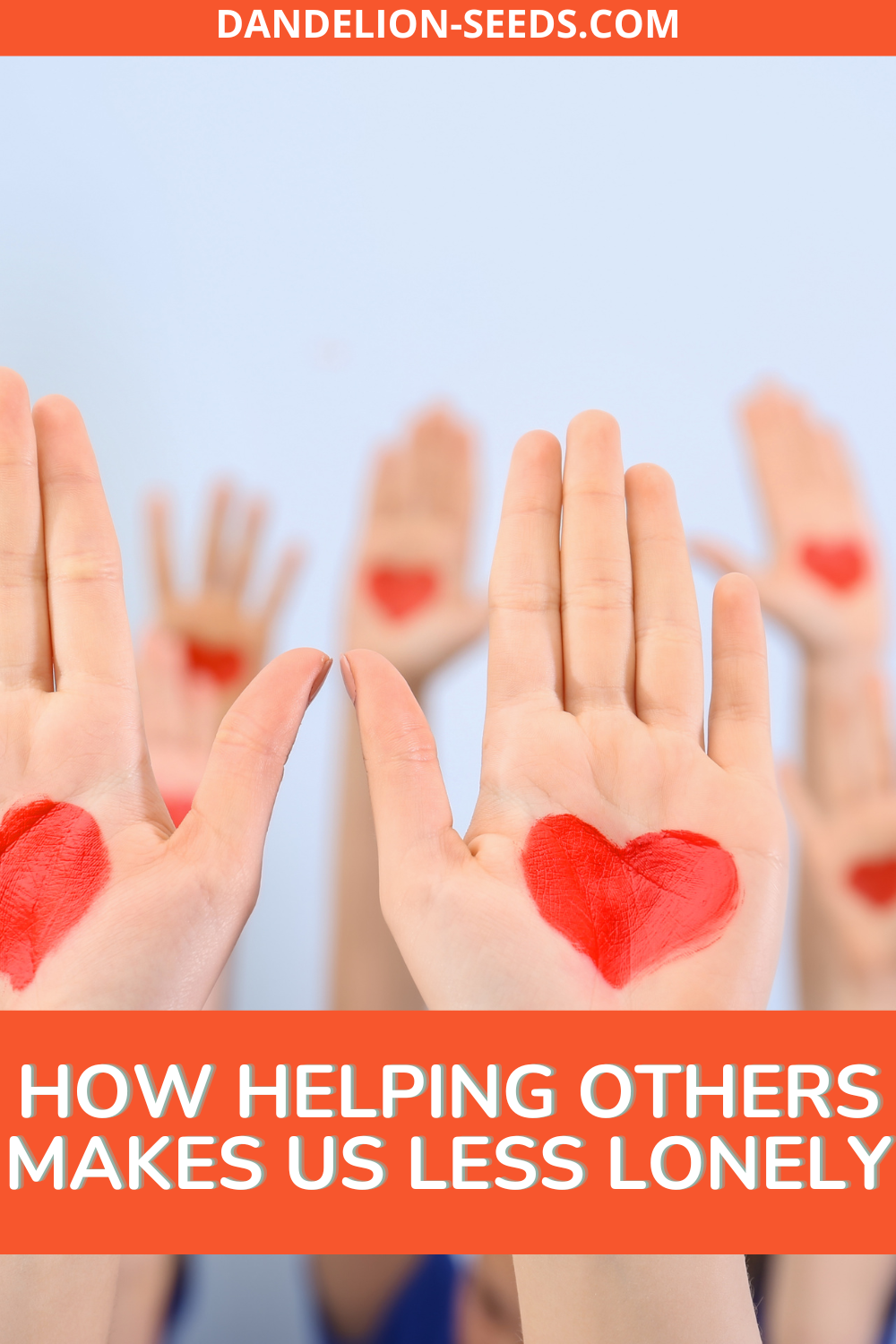
No one talks about this part of being a lonely mom, but I'll risk it: my own feelings of "Hey, people should be embracing me" were, well, all about me.
Here's the funny part, though.
All sorts of studies show that when we serve others, we're happier. That's a form of true connection. It helps give meaning and purpose to otherwise solitary days---and helps shift our focus outward.
Involving kids in serving others is beneficial, too.
Related post: 25 Acts of Kindness for Kids
It helps teach them their impact on society and broadens their horizons.
Your efforts don't need to be big. Start by smiling at others as you walk down the street. It might be exactly the gift someone needs that day.
And you just might happen to meet someone you like.
As a lonely mom, I realized two things: "I really want to connect with others," and "My mental health suffers when I don't."
I also realized that connecting didn't always need to come in the form of new friends.
Indeed, it's great to connect with people in person. What still works surprisingly well is to talk on the phone with my best friend from junior high or a friend I knew from graduate school.
We don't have kids who are the same age. We can't have playdates. But they know me. They love me. And no matter how far we live from one another, every time we speak, we pick up right where we left off.
That, more than anything else, is often what my heart needs.
If we keep "putting ourselves out there," one of the new mamas we meet might someday turn into exactly that kind of friend, too.
In an ideal world, mom friends just "pop up" when we need them. However, reality is that we have to put in some effort into connecting in our community if we expect to climb out of the loneliness hole.
It's possible, though, one step at a time. And most moms in the world really do "get it," and many who've been there sincerely want to help.
Meeting other women is helpful, but connecting with just one single mom friend can reduce feelings of social isolation.
From there, you'll connect with more like-minded people---whether you're still living in your hometown or you've moved a million miles away.
If "play is the work of childhood" (a quote by child psychologist Jean Piaget), then playful parenting is the best way we can work with our children. It's the absolute key to cooperation.
Children play "rain or shine"---it helps them decrease stress, learn new things, and figure out the world (source). Parents do well to remember that the time we invest playing not only helps us connect to our kids, but also makes our job as parents easier. I've never met a child who didn't love it when a parent brought a playful attitude and laughter to the relationship. It helps kids feel close and emotionally understood.
Playful parenting is all about connection.
We want to enjoy our interactions with our children. If we focus on "getting" them do things, the relationship becomes about power. Instead, I'd encourage parents to work alongside their children as partners against whatever problems they're trying to solve.
True, for our kids' well being, we need to set healthy boundaries—our influence is key in that. That's what positive parenting is all about; working with kids rather than against them. Being a playful parent signals to a child that we're on their side—we're in this together. We can connect and be close without power struggles.

How does it work, though, for adults who aren't as naturally playful as kids are? Our brains are wired quite differently from theirs! As we know, kids can have fun playing with parents, friends, and even cardboard boxes. (Fortunately, boxes are wonderful toys.)
The tips below work especially well for ages of 2 - 7, but versions of them can continue well beyond these years.
One fun way to accomplish this is to feign total incompetence. As you approach your child with her hairbrush, say, "Open wide! Time to brush your teeth!" Similarly, holding the toothbrush, say, "Oh, this will make your hair so fancy!" Your child will love the feeling of power and total competence as they point out the error of your ways. You, of course, will be shocked to learn your mistake. With exaggerated hesitation, you will try it their way for a moment. After a minute (especially if they start to protest), add, "That's right! I use this on your ARM! Arm, be still." Use your own arm if need be. It's okay to go back and forth a time or three to get it done.
Try to trust your child's timing here. If they need help remembering to check, however, make it fun. Maybe they're climbing onto a choo choo train. Perhaps it's a rocket that's about to blast off to a new solar system.
Do YOU, parent, fit into that 3T sweater? Please try. If your child isn't keen to get dressed, a bit of laughter clears the air and helps you connect. It's worth the time to slow down and be silly if it cancels the 45-minute tantrum that might otherwise ensue.
Another great way to accomplish getting your child ready for the day is to involve the stuffed animals. They're your allies. Can your child dress a doll while you're putting on his socks? Can your kiddo tell you what his animal friend needs to wear for his rainy day, and what he might need to do to match him? Get your kids outside their heads here. Involve them in care taking,
Cease talking about cleaning and all that "responsibility" rubbish (child view). Since this is a common trouble spot, I'll share several ideas. The key idea is this: Changing your nomenclature helps tremendously. Use kid terms. Not only enter, but lead, the world of make-believe.
When you see a bunch of toy cars all over the floor, notice the incredible traffic jam. The drivers need help getting back to their proper parking garage (the toy box)! "Drive" them back together. Sound effects help.
Building blocks have somehow scattered across the floor and need to make it back into the bag? No problem! You're not holding a bag; you're holding the HUNGRY MONSTER. "Feed me!" it bellows playfully. "Hungry! Must eat blocks! More! More!" On it goes until the mess is gone.
Get creative. If something doesn't have a logical "home" (like cars in a box you call a parking garage), make it silly. "Let's put all the dolls in the tree house [on the shelf] for the night!" Even a paper bag can be a "tent" for something. Bring toys and their storage spaces to life.
Lastly, remember how incompetent you were at brushing teeth and hair? You're even worse when it comes to picking up the toys! A ball? It weighs as much as a semi truck! How in the world can you lift it? Can someone save the day? (Many children love to rescue adults.) That giant toy elephant, however, is a breeze for you---it's light as a feather. Your superpowers are very confusing---and hilarious.
Although I often shy away from competition, this is the one time I'll offer a race. Who can put on shoes the fastest and touch the doorknob? For some kids (particularly highly sensitive ones), however, competition causes anxiety, so use it with caution.
Would anyone like to hop to the door like a bunny? Roll across the rug to get there? Be carried and spun in circles? Sometimes a different mode of transportation is all they need.
If your child can help put away non-breakable items from the dishwasher, for example, let them try. A great question to ask (even if they've done it before) is "Do you think you're strong enough to move these cups from the dishwasher to the counter?" Children love feeling competent. So much of their existence includes not knowing what to do, so when they feel capable, it's incredibly empowering for them.
This is involved parenting. This is parenting for connection. Sure, it might seem to take more time "in the moment," but ultimately, it can save your kiddo buckets full of tears and help you both feel like you're really in this together as a team. Because you are!
And, you might be surprised how willing children become to do tasks on their own after they've learned in an emotionally safe place with you---and they feel connected. It's a wonderful return on your investment. Long-term connections start when kids are little. Being a playful parent is a part of the equation that you can both enjoy.
